读书笔记之:Boost程序库完全开发指南(Ch1-4)
第0章 导读
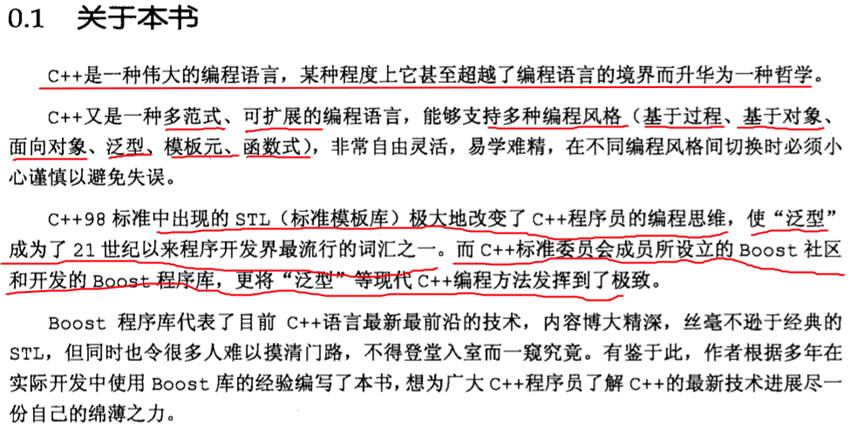
第1章 Boost程序库总论
1.什么是Boost
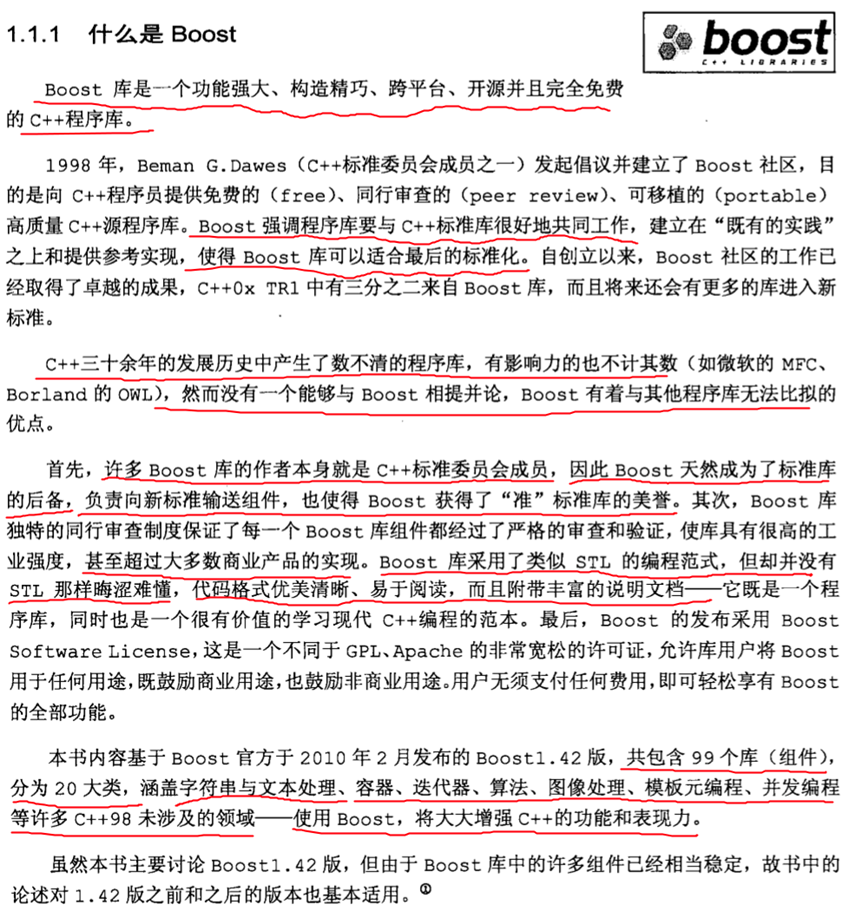
2. 如何使用Boost
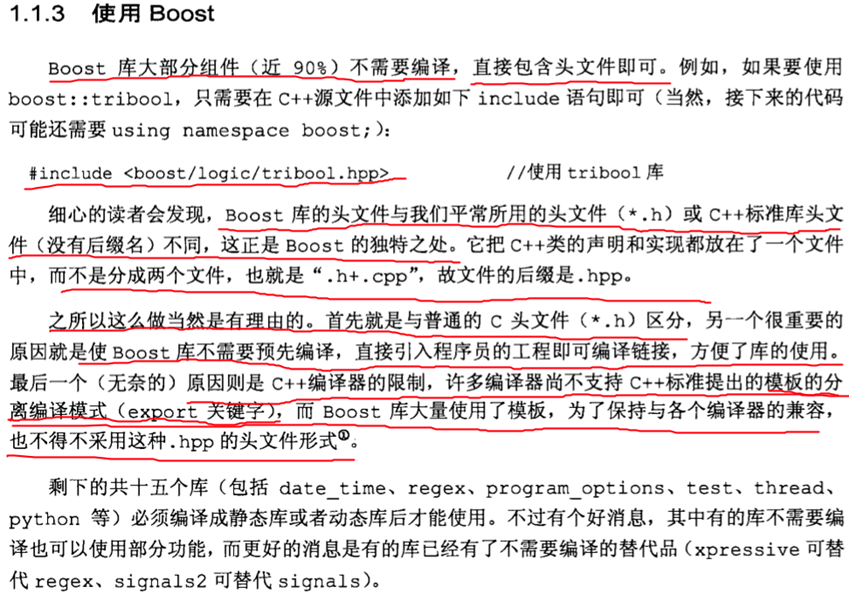
3.什么是STLprot
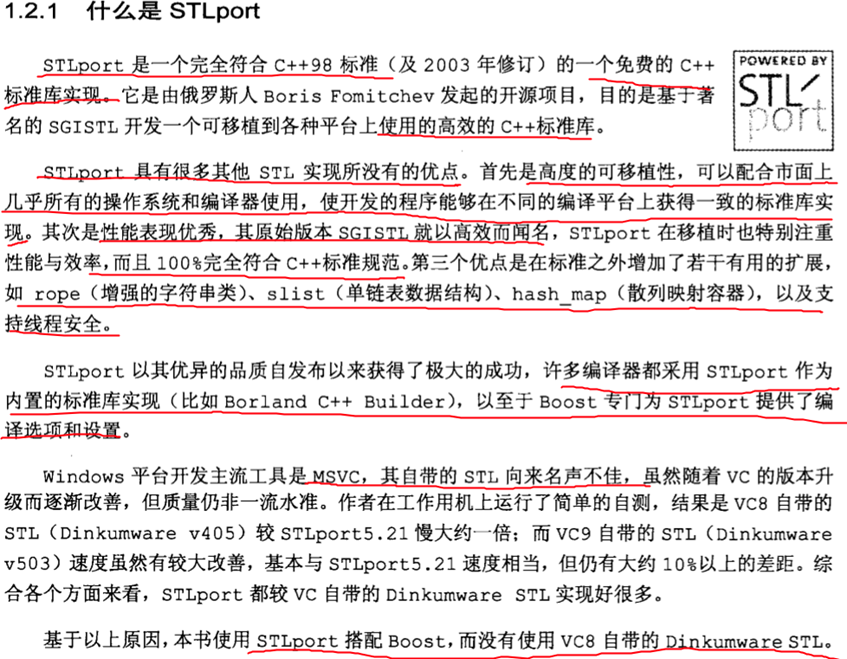
4.开发环境
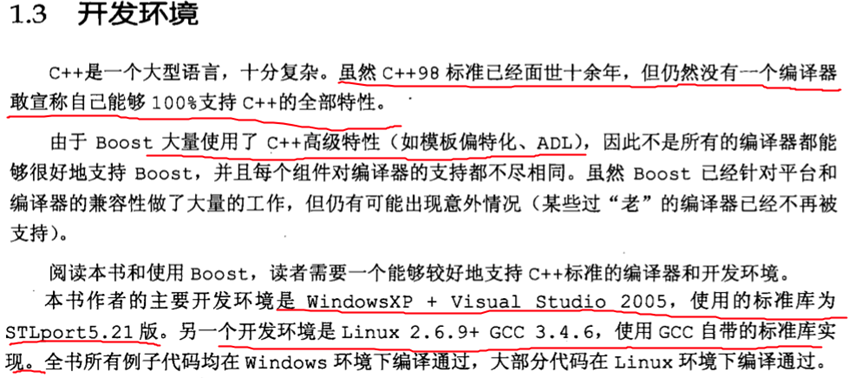
第2章 时间与日期
1. timer库
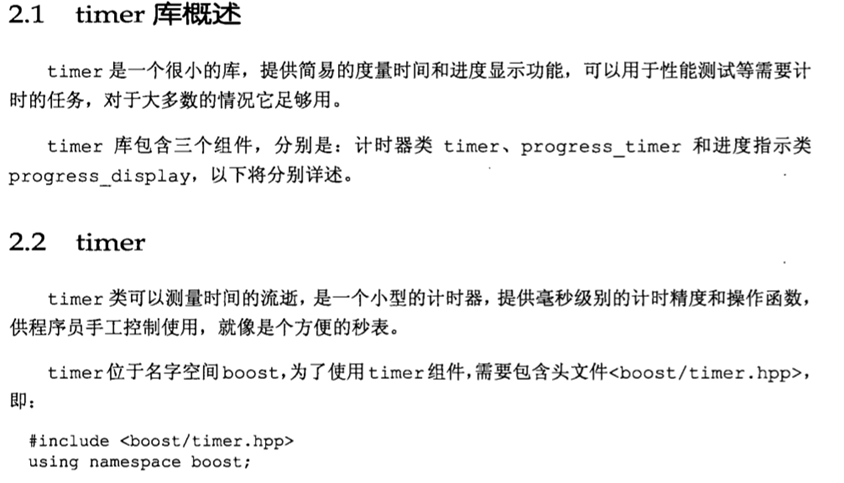

代码如下:
 View Code
View Code
#include <iostream>
#include <boost/timer.hpp>
using namespace std;
using namespace boost;
int main(){
timer t;
cout<<"max timespan:"<<t.elapsed_max()/3600<<"h"<<endl;
cout<<"min timespan:"<<t.elapsed_min()<<"s"<<endl;
cout<<"now time elapsed:"<<t.elapsed()<<"s"<<endl;
}
#include <boost/timer.hpp>
using namespace std;
using namespace boost;
int main(){
timer t;
cout<<"max timespan:"<<t.elapsed_max()/3600<<"h"<<endl;
cout<<"min timespan:"<<t.elapsed_min()<<"s"<<endl;
cout<<"now time elapsed:"<<t.elapsed()<<"s"<<endl;
}

2. progress_timer使用
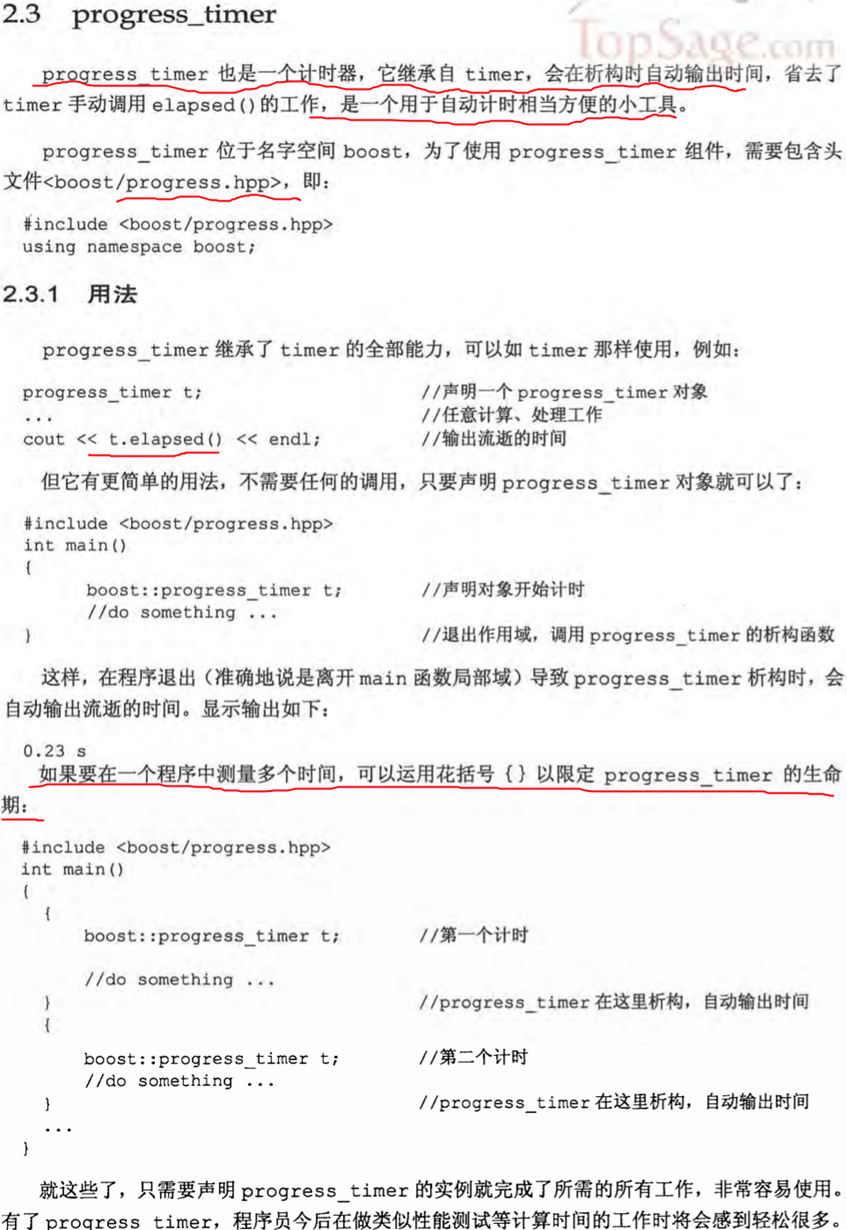
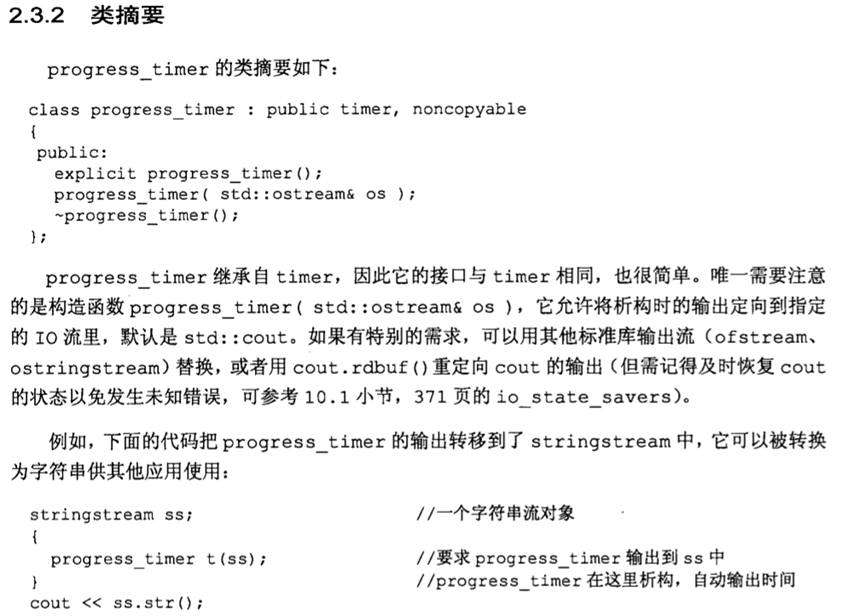
3. progress_display使用

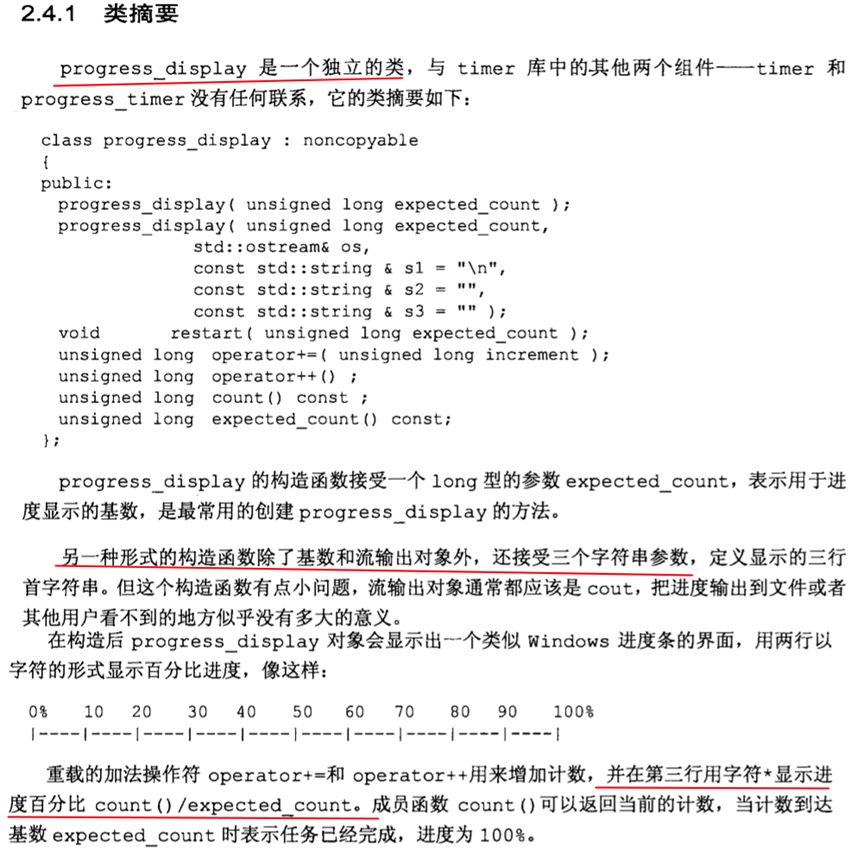
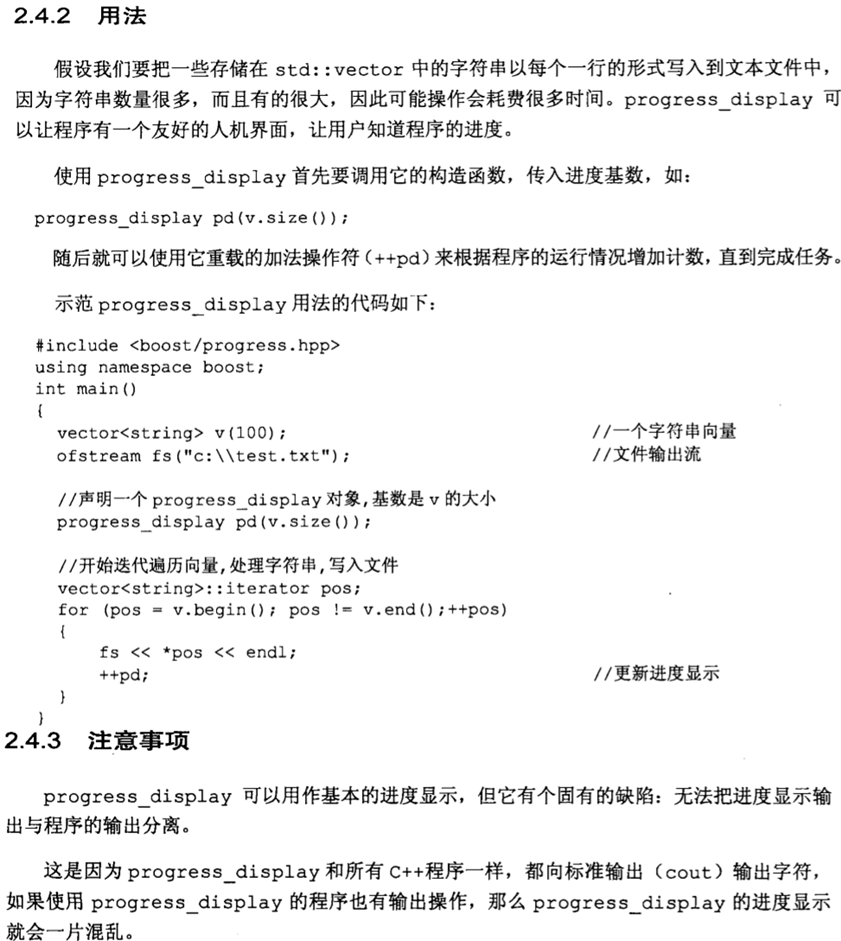
代码如下:
 View Code
View Code
#include <iostream>
#include <fstream>
#include <vector>
#include <string>
#include <boost/progress.hpp>
using namespace std;
using namespace boost;
int main(){
vector<string> v(1000000);
ofstream fs("a.txt");
if(!fs){
cout<<"can't open file a.txt"<<endl;
return -1;
}
progress_display pd(v.size());
vector<string>::iterator pos;
for(pos=v.begin();pos!=v.end();++pos){
fs<<*pos<<endl;
++pd;
}
}
#include <fstream>
#include <vector>
#include <string>
#include <boost/progress.hpp>
using namespace std;
using namespace boost;
int main(){
vector<string> v(1000000);
ofstream fs("a.txt");
if(!fs){
cout<<"can't open file a.txt"<<endl;
return -1;
}
progress_display pd(v.size());
vector<string>::iterator pos;
for(pos=v.begin();pos!=v.end();++pos){
fs<<*pos<<endl;
++pd;
}
}
4.date_time库
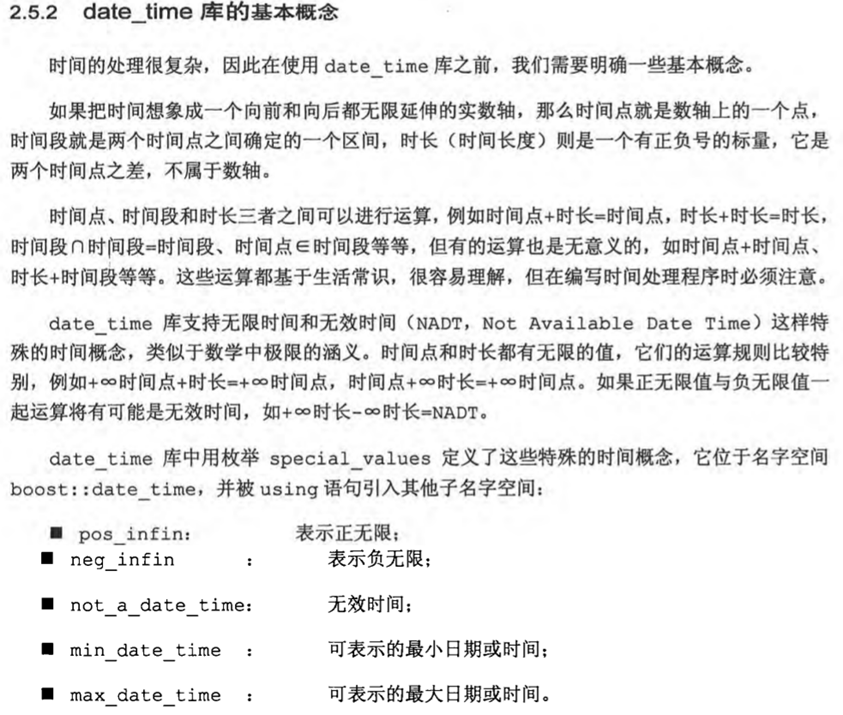
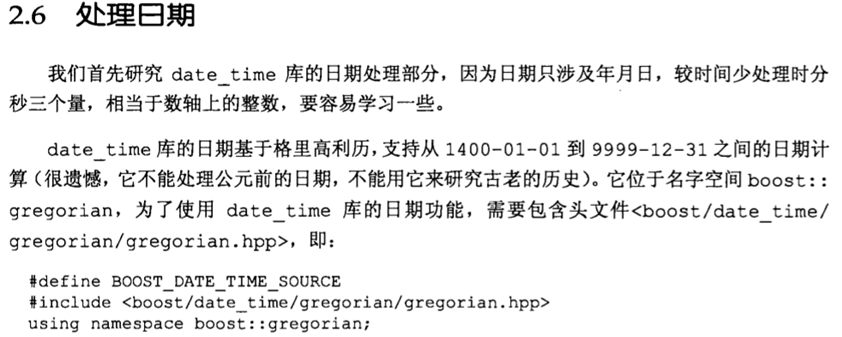
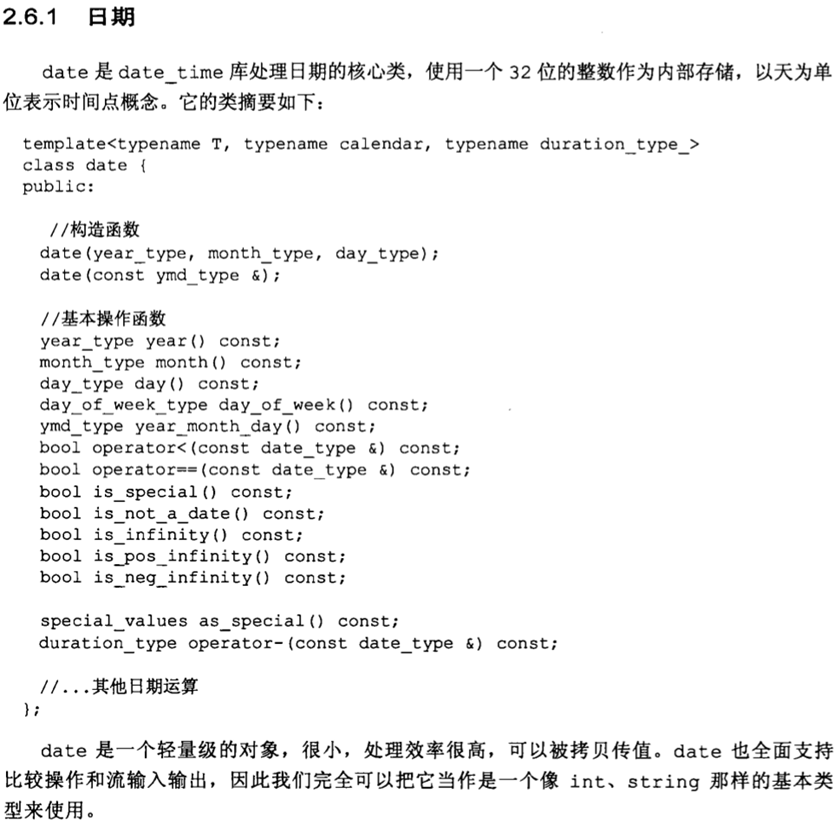
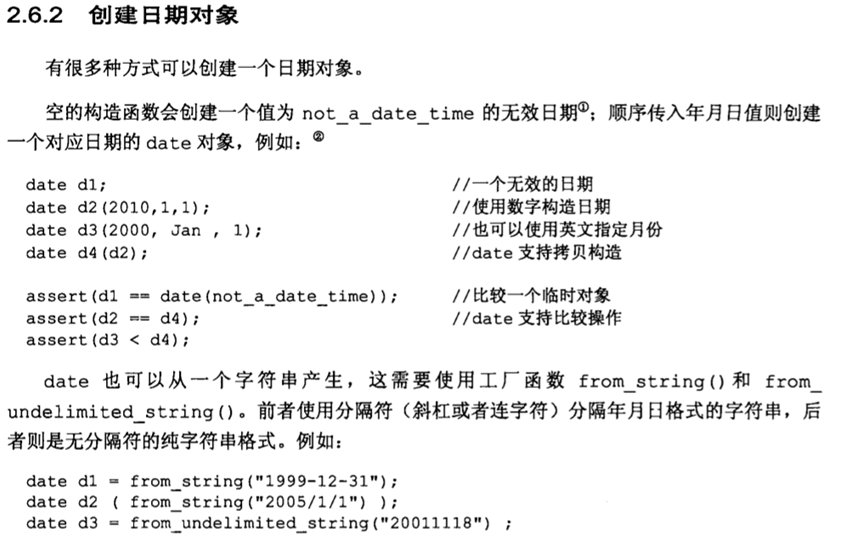
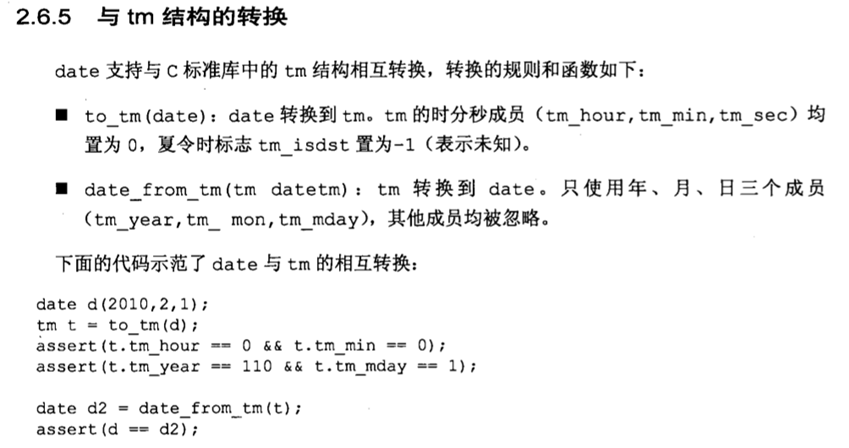
部分测试代码如下:
 View Code
View Code
#include <iostream>
#include <boost/date_time/gregorian/gregorian.hpp>
#include <boost/date_time.hpp>
#include <algorithm>
#define BOOST_DATE_TIME_SOURCE
using namespace std;
using namespace boost::gregorian;
//using namespace boost;
void test1(){
date d(2008,11,20);
// cout<<to_simple_string(d)<<endl;
// cout<<to_iso_string(d)<<endl;
// cout<<to_iso_extended_string(d)<<endl;
cout<<d<<endl;
// cin>>d;
// cout<<d;
}
void test2(){
date d1(2000,1,1),d2(2008,8,8);
cout<<d2-d1<<endl;
}
void test3(){
date d(2008,11,20);
date d_start(d.year(),d.month(),1);
date d_end=d.end_of_month();
for(day_iterator d_iter(d_start);
d_iter!=d_end;++d_iter){
cout<<*d_iter<<" "<<
d_iter->day_of_week()<<endl;
}
}
void test4(){
date d(2008,11,20);
date d18years=d+years(18);
cout<<d18years<<" is "<<d18years.day_of_week()<<endl;
int count=0;
for(day_iterator d_iter(date(d18years.year(),11,1));
d_iter!=d18years.end_of_month();++d_iter){
if(d_iter->day_of_week()==Sunday)
++count;
}
cout<<"total "<<count<<" Sundays."<<endl;
count=0;
for(month_iterator m_iter(date(d18years.year(),1,1));
m_iter<date(d18years.year()+1,1,1);++m_iter){
count+=m_iter->end_of_month().day();
}
cout<<"total "<<count<<" days of year."<<endl;
}
class credit_card{
public:
string bank_name;
int bill_day_no;
credit_card(const char* bname,int no):
bank_name(bname),bill_day_no(no){}
int calc_free_days(date consume_day=day_clock::local_day())const{
date bill_day(consume_day.year(),consume_day.month(),bill_day_no);
if(consume_day>bill_day){
bill_day+=months(1);
}
return (bill_day-consume_day).days()+20;
}
friend bool operator<(const credit_card& l,const credit_card& r){
return l.calc_free_days()<r.calc_free_days();
}
};
void test5(){
credit_card a("A_bank",25);
credit_card b("B_bank",12);
credit_card tmp=std::max(a,b);
cout<<"You should use "<<tmp.bank_name<<", free days = "<<tmp.calc_free_days()<<endl;
}
int main(){
test5();
}
#include <boost/date_time/gregorian/gregorian.hpp>
#include <boost/date_time.hpp>
#include <algorithm>
#define BOOST_DATE_TIME_SOURCE
using namespace std;
using namespace boost::gregorian;
//using namespace boost;
void test1(){
date d(2008,11,20);
// cout<<to_simple_string(d)<<endl;
// cout<<to_iso_string(d)<<endl;
// cout<<to_iso_extended_string(d)<<endl;
cout<<d<<endl;
// cin>>d;
// cout<<d;
}
void test2(){
date d1(2000,1,1),d2(2008,8,8);
cout<<d2-d1<<endl;
}
void test3(){
date d(2008,11,20);
date d_start(d.year(),d.month(),1);
date d_end=d.end_of_month();
for(day_iterator d_iter(d_start);
d_iter!=d_end;++d_iter){
cout<<*d_iter<<" "<<
d_iter->day_of_week()<<endl;
}
}
void test4(){
date d(2008,11,20);
date d18years=d+years(18);
cout<<d18years<<" is "<<d18years.day_of_week()<<endl;
int count=0;
for(day_iterator d_iter(date(d18years.year(),11,1));
d_iter!=d18years.end_of_month();++d_iter){
if(d_iter->day_of_week()==Sunday)
++count;
}
cout<<"total "<<count<<" Sundays."<<endl;
count=0;
for(month_iterator m_iter(date(d18years.year(),1,1));
m_iter<date(d18years.year()+1,1,1);++m_iter){
count+=m_iter->end_of_month().day();
}
cout<<"total "<<count<<" days of year."<<endl;
}
class credit_card{
public:
string bank_name;
int bill_day_no;
credit_card(const char* bname,int no):
bank_name(bname),bill_day_no(no){}
int calc_free_days(date consume_day=day_clock::local_day())const{
date bill_day(consume_day.year(),consume_day.month(),bill_day_no);
if(consume_day>bill_day){
bill_day+=months(1);
}
return (bill_day-consume_day).days()+20;
}
friend bool operator<(const credit_card& l,const credit_card& r){
return l.calc_free_days()<r.calc_free_days();
}
};
void test5(){
credit_card a("A_bank",25);
credit_card b("B_bank",12);
credit_card tmp=std::max(a,b);
cout<<"You should use "<<tmp.bank_name<<", free days = "<<tmp.calc_free_days()<<endl;
}
int main(){
test5();
}
5.总结
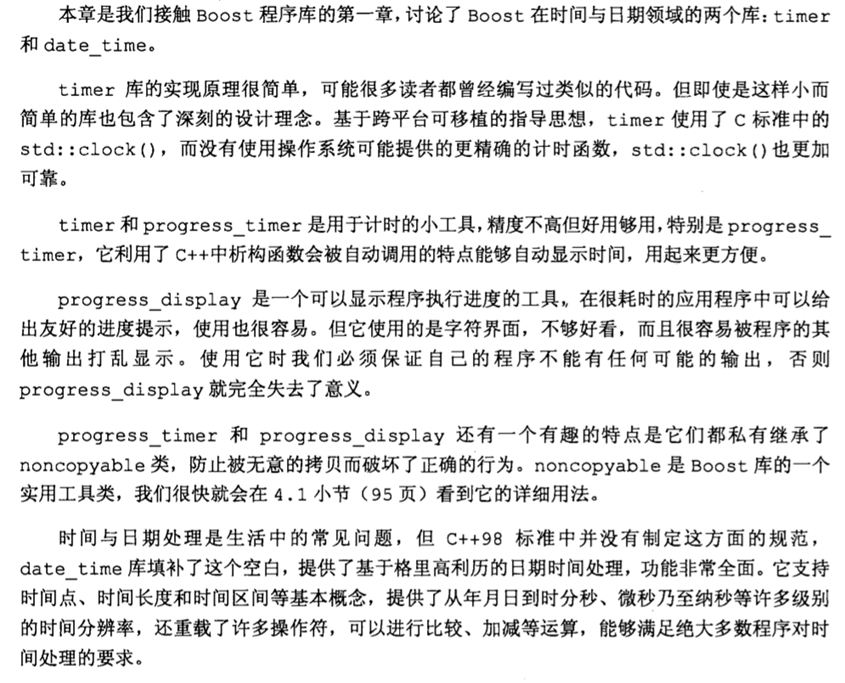
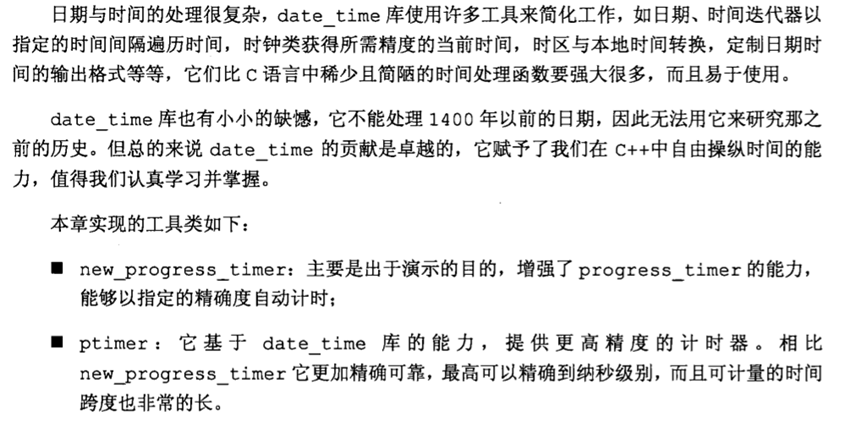
第3章 内存管理
1. RAII机制
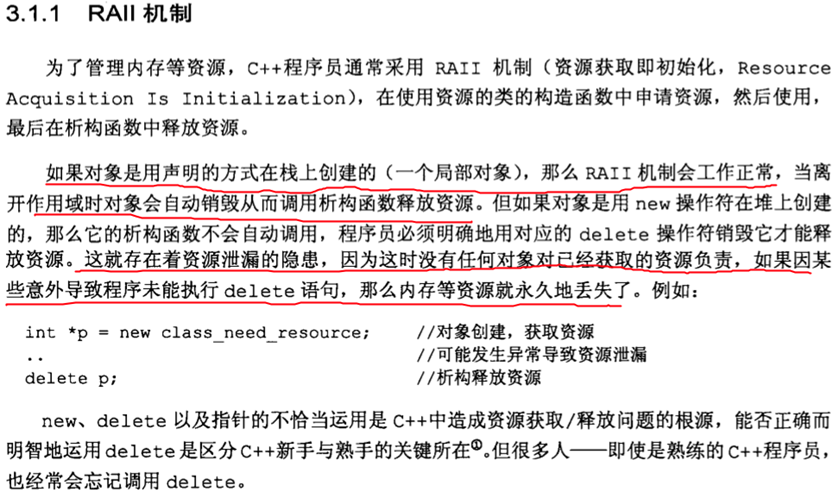
2. 智能指针
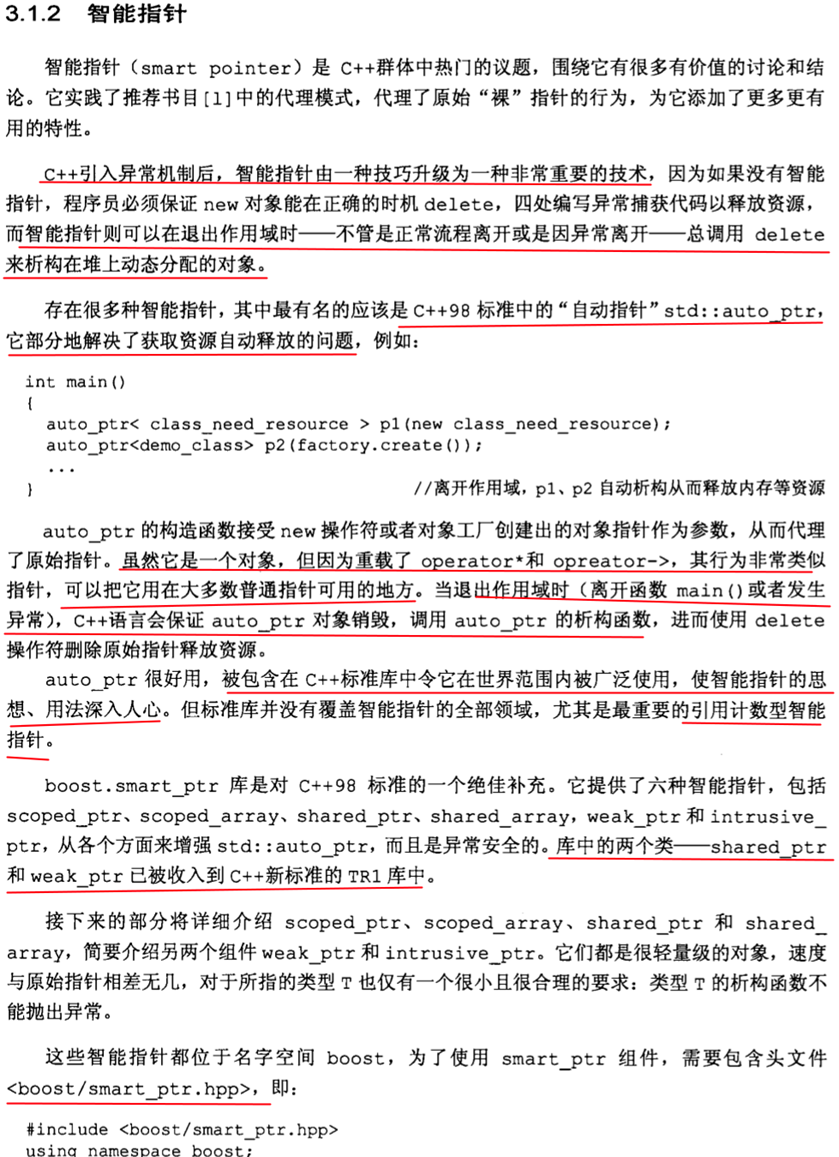
3. scoped_ptr
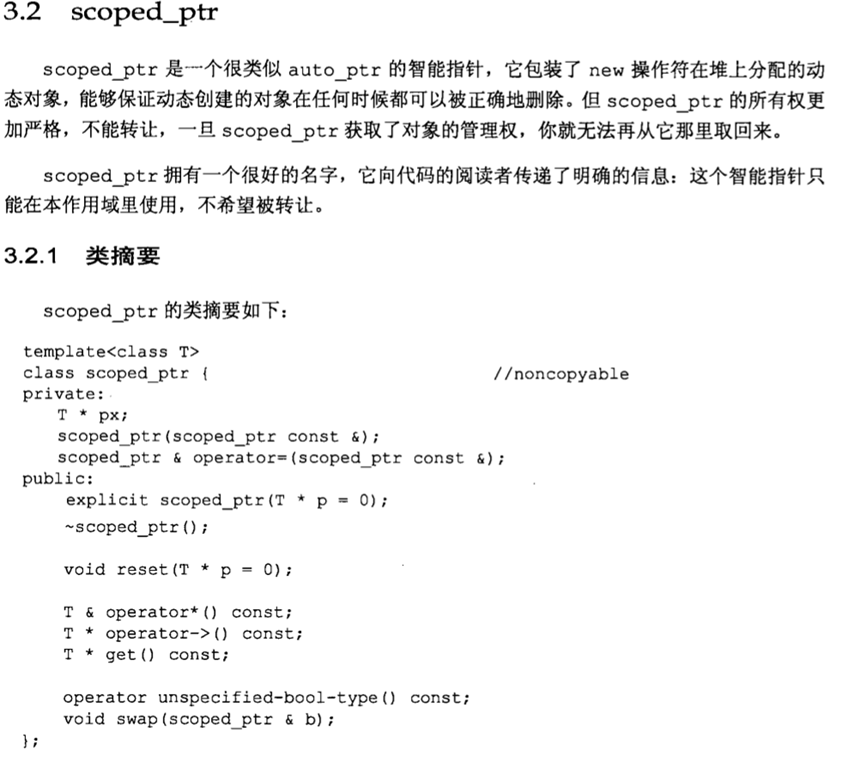
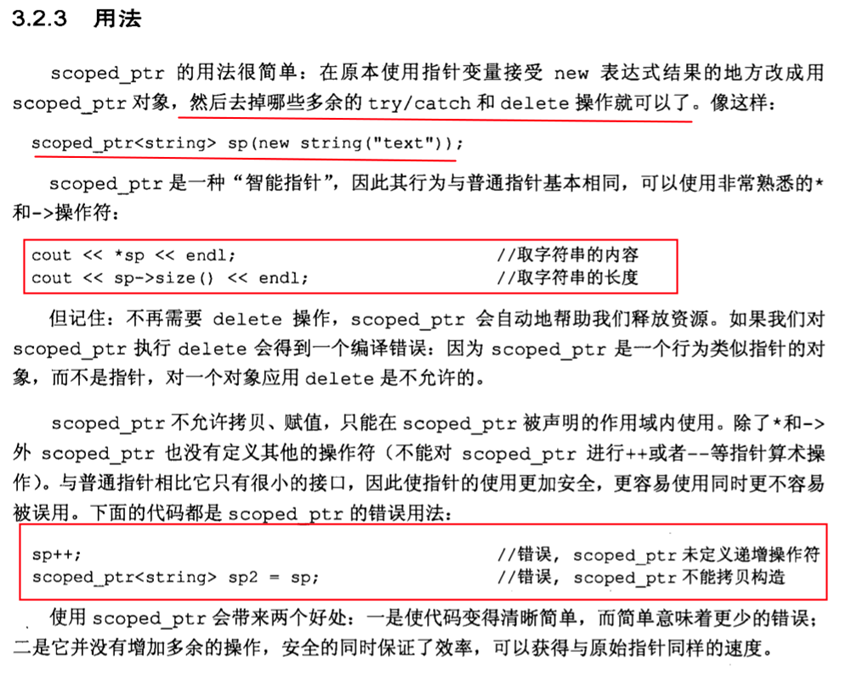
测试代码如下:
 View Code
View Code
#include <iostream>
#include <boost/smart_ptr.hpp>
using namespace std;
using namespace boost;
struct posix_file{
posix_file(const char* file_name){
cout<<"open file:"<<file_name<<endl;
}
~posix_file(){
cout<<"close file"<<endl;
}
};
int main(){
scoped_ptr<int> p(new int);
if(p){
*p=100;
cout<<*p<<endl;
}
p.reset();
assert(p==0);
if(!p){
cout<<"scoped_ptr==null"<<endl;
}
scoped_ptr<posix_file> fp(new posix_file("a.txt"));
}
#include <boost/smart_ptr.hpp>
using namespace std;
using namespace boost;
struct posix_file{
posix_file(const char* file_name){
cout<<"open file:"<<file_name<<endl;
}
~posix_file(){
cout<<"close file"<<endl;
}
};
int main(){
scoped_ptr<int> p(new int);
if(p){
*p=100;
cout<<*p<<endl;
}
p.reset();
assert(p==0);
if(!p){
cout<<"scoped_ptr==null"<<endl;
}
scoped_ptr<posix_file> fp(new posix_file("a.txt"));
}
scope_ptr与auto_ptr的区别
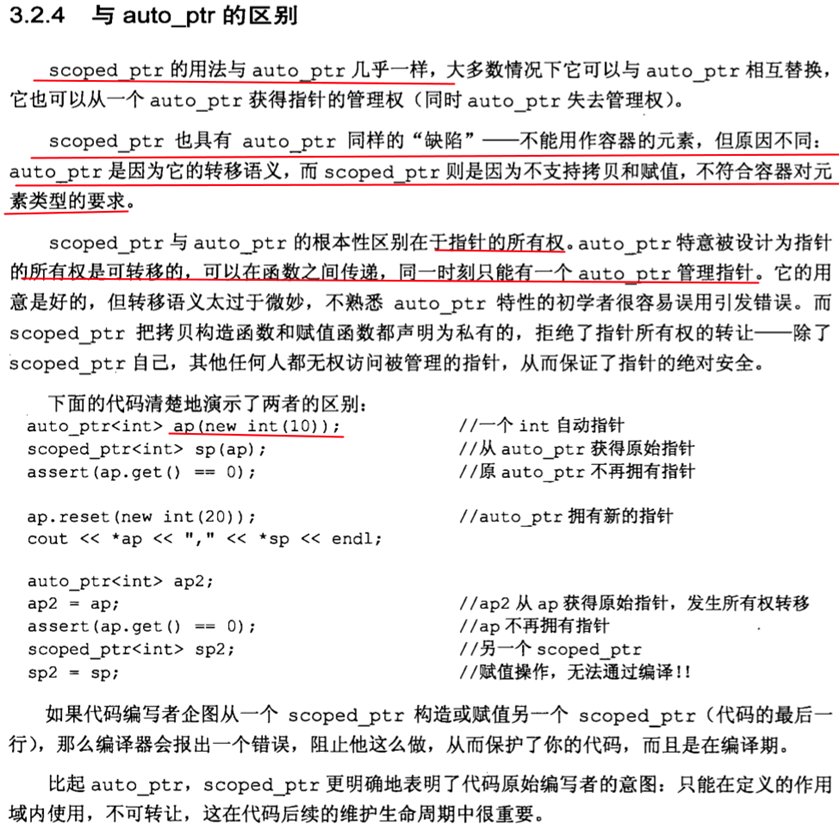
4. scope_array
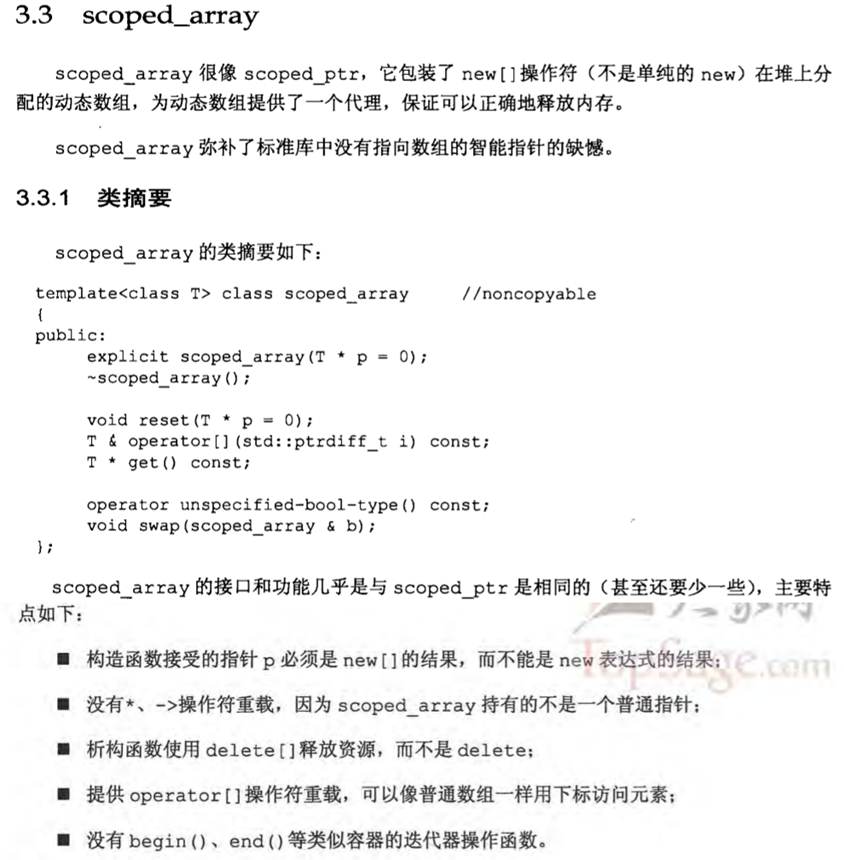

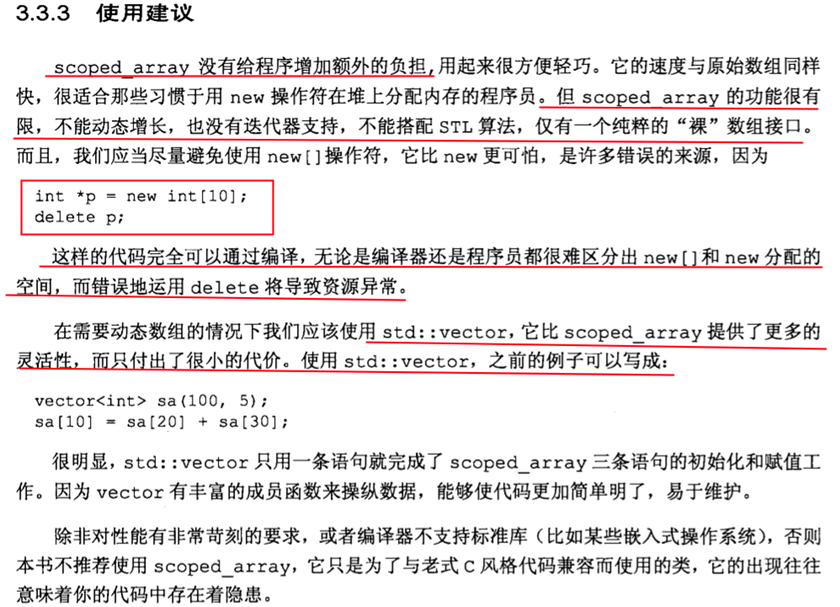
5. shared_ptr

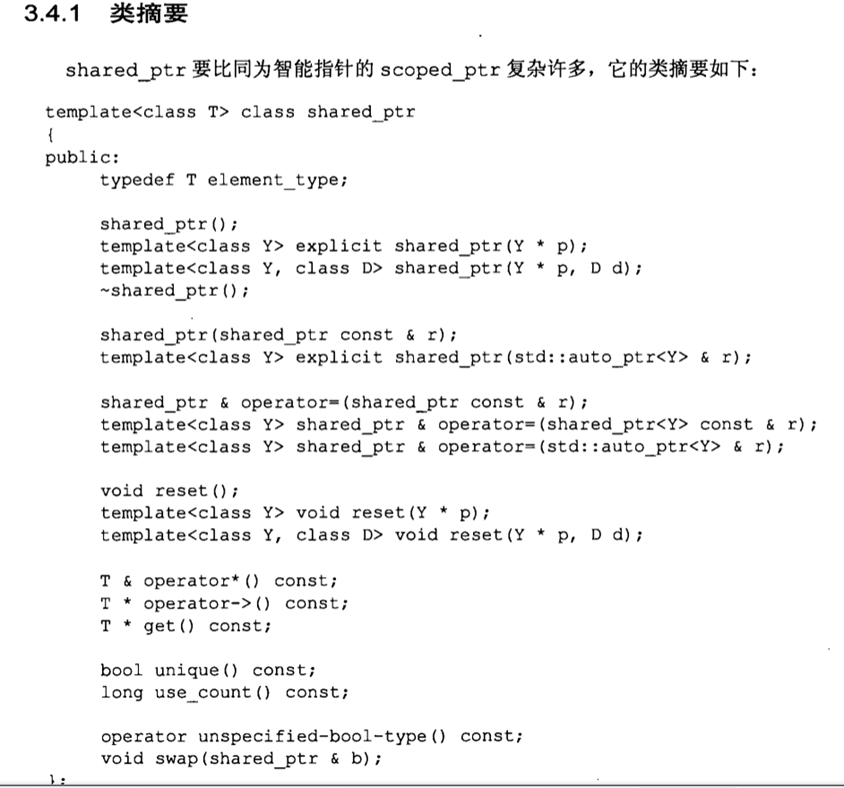
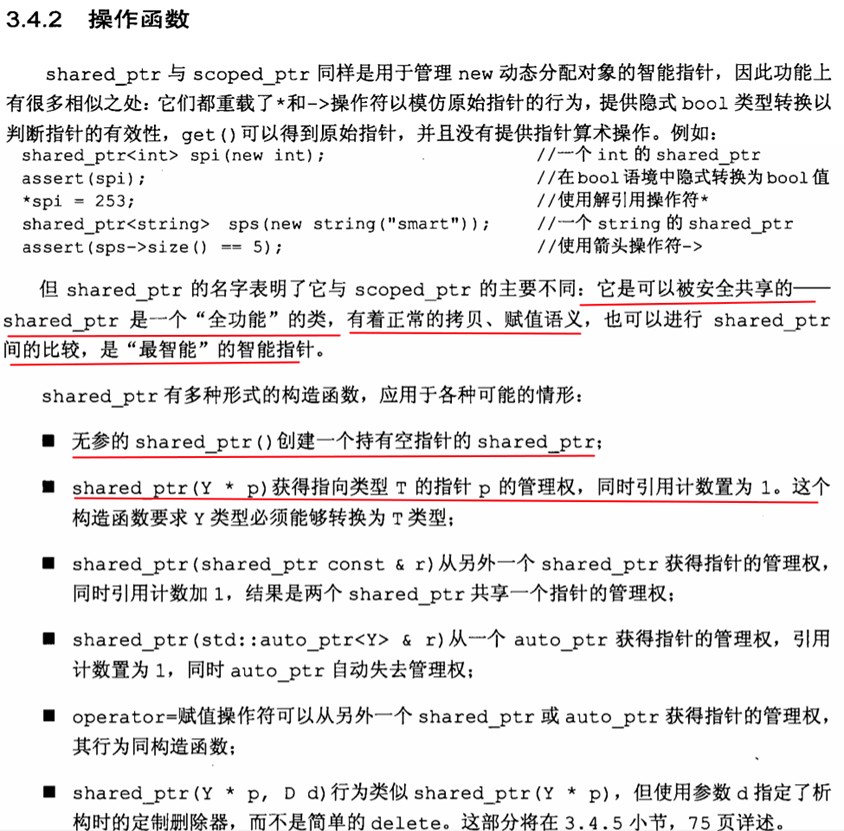

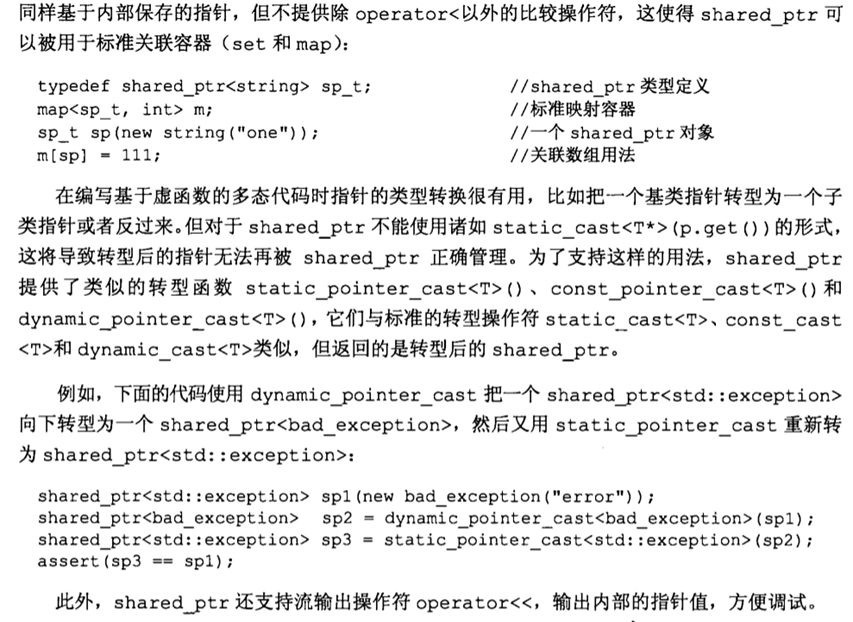

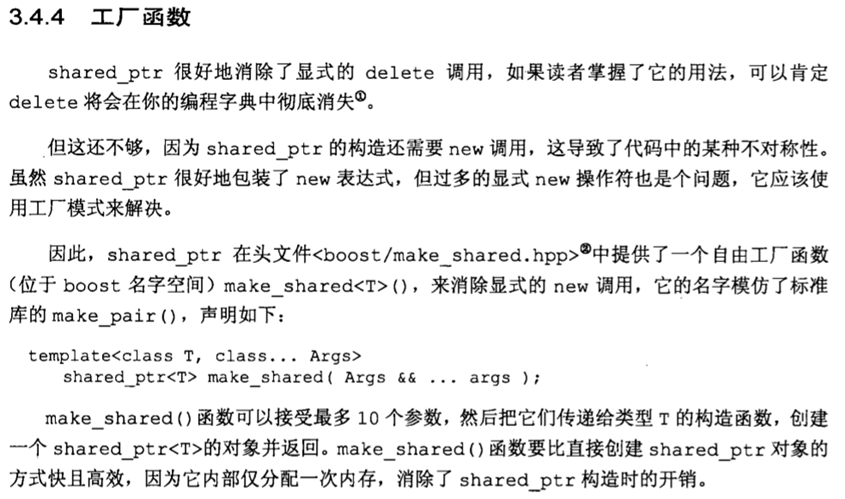
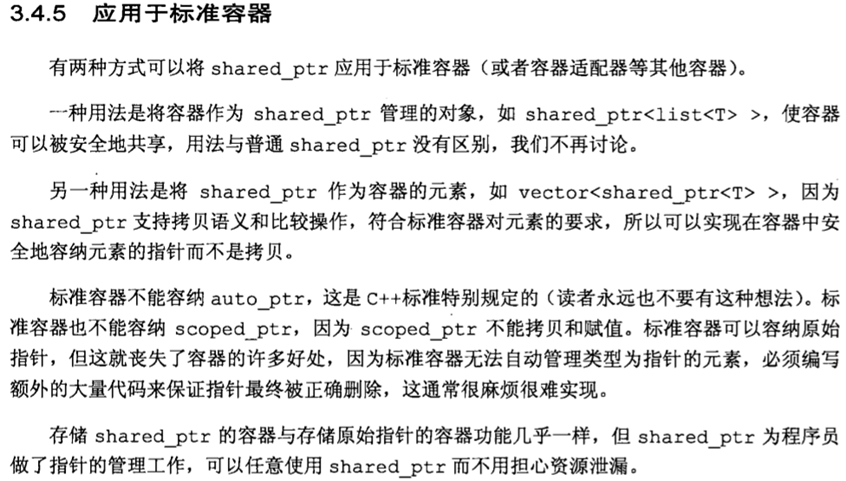

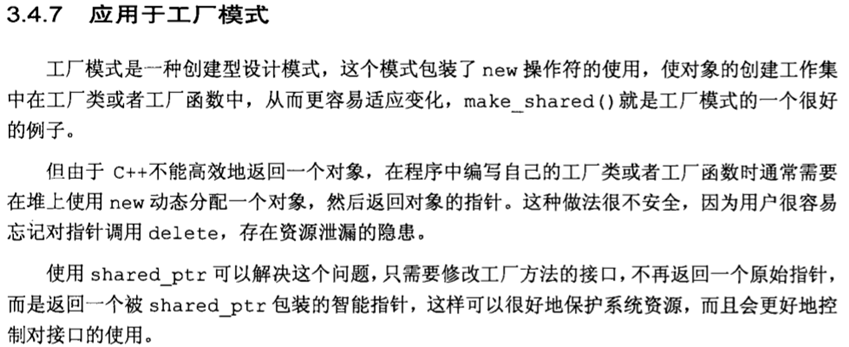
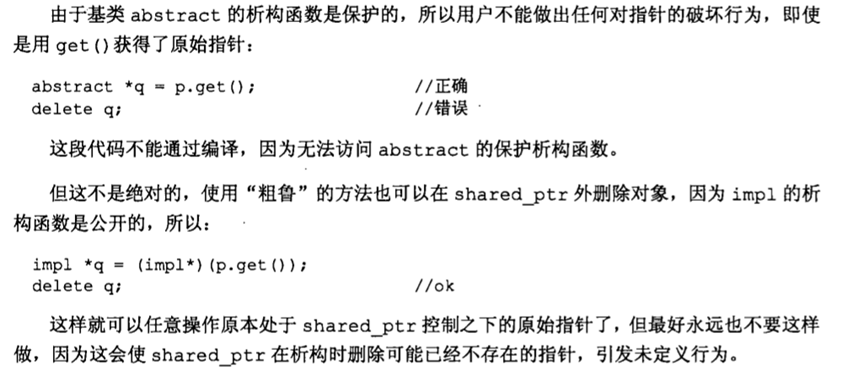
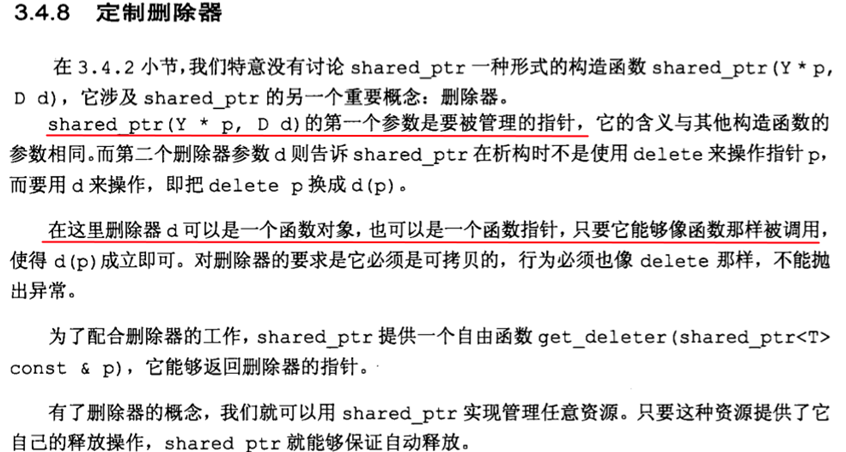


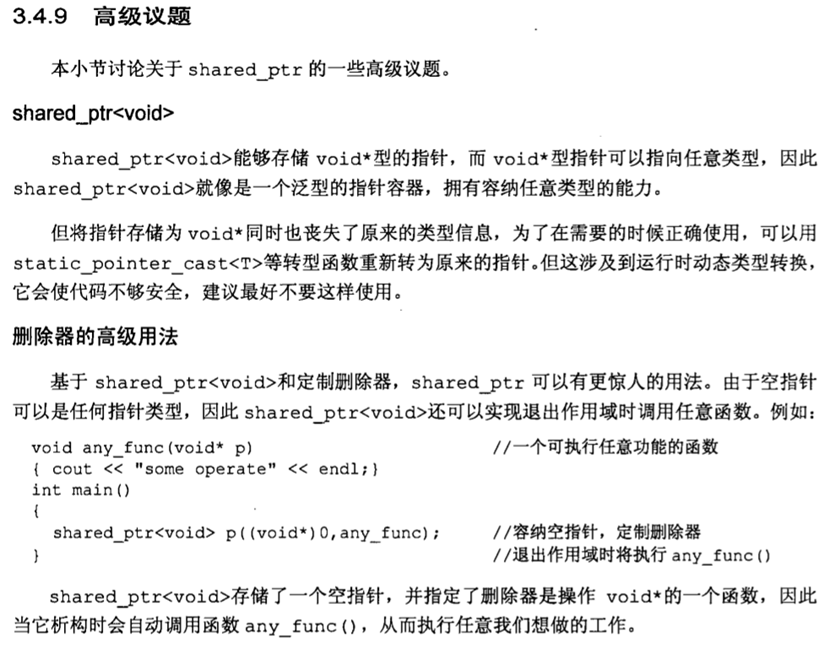
测试代码:
 View Code
View Code
#include <iostream>
#include <string>
#include <vector>
#include <boost/smart_ptr.hpp>
#include <boost/make_shared.hpp>
using namespace std;
using namespace boost;
void test1(){
shared_ptr<int> sp(new int(10));
cout<<*sp<<endl;
shared_ptr<int> sp2=sp;
cout<<*sp<<endl;
*sp2=100;
cout<<*sp2<<endl;
}
class shared{
private:
shared_ptr<int> p;
public:
shared(shared_ptr<int> p_):p(p_){}
void print(){
cout<<"count:"<<p.use_count()<<" v="<<*p<<endl;
}
};
void print_func(shared_ptr<int> p){
cout<<"count:"<<p.use_count()<<" v="<<*p<<endl;
}
void test2(){
shared_ptr<int> p(new int(100));
shared s1(p),s2(p);
s1.print();
s2.print();
*p=20;
print_func(p);
s1.print();
}
void test3(){
shared_ptr<string> sp=make_shared<string>("make_shared");
cout<<*sp<<endl;
shared_ptr<vector<int> > spv=make_shared<vector<int> >(10,2);
// cout<<*spv<<endl;
cout<<spv->size()<<endl;
}
void test4(){
typedef vector<shared_ptr<int> > vs;
vs v(10);
int i=0;
for(vs::iterator pos=v.begin();pos!=v.end();++pos){
*pos=make_shared<int>(++i);
cout<<*(*pos)<<", ";
}
cout<<endl;
shared_ptr<int> p=v[9];
*p=100;
cout<<*v[9]<<endl;
}
class sample{
private:
class impl;
shared_ptr<impl> p;
public:
sample();
void print();
};
class sample::impl{
public:
void print(){
cout<<"impl print"<<endl;
}
};
sample::sample():p(new impl){}
void sample::print(){
p->print();
}
void test5(){
sample s;
s.print();
}
class abstract{
public:
virtual void f()=0;
virtual void g()=0;
protected:
virtual ~abstract(){}
};
class impl2:public abstract{
public:
void f(){
cout<<"class impl2 f"<<endl;
}
void g(){
cout<<"class impl2 g"<<endl;
}
};
class impl3:public abstract{
public:
void f(){
cout<<"class impl3 f"<<endl;
}
void g(){
cout<<"class impl3 g"<<endl;
}
};
shared_ptr<abstract> create_impl2(){
return shared_ptr<abstract>(new impl2);
}
shared_ptr<abstract> create_impl3(){
return shared_ptr<abstract>(new impl3);
}
void test6(){
shared_ptr<abstract> p2=create_impl2();
p2->f();
p2->g();
shared_ptr<abstract> p3=create_impl3();
p3->f();
p3->g();
}
int main(){
test6();
}
#include <string>
#include <vector>
#include <boost/smart_ptr.hpp>
#include <boost/make_shared.hpp>
using namespace std;
using namespace boost;
void test1(){
shared_ptr<int> sp(new int(10));
cout<<*sp<<endl;
shared_ptr<int> sp2=sp;
cout<<*sp<<endl;
*sp2=100;
cout<<*sp2<<endl;
}
class shared{
private:
shared_ptr<int> p;
public:
shared(shared_ptr<int> p_):p(p_){}
void print(){
cout<<"count:"<<p.use_count()<<" v="<<*p<<endl;
}
};
void print_func(shared_ptr<int> p){
cout<<"count:"<<p.use_count()<<" v="<<*p<<endl;
}
void test2(){
shared_ptr<int> p(new int(100));
shared s1(p),s2(p);
s1.print();
s2.print();
*p=20;
print_func(p);
s1.print();
}
void test3(){
shared_ptr<string> sp=make_shared<string>("make_shared");
cout<<*sp<<endl;
shared_ptr<vector<int> > spv=make_shared<vector<int> >(10,2);
// cout<<*spv<<endl;
cout<<spv->size()<<endl;
}
void test4(){
typedef vector<shared_ptr<int> > vs;
vs v(10);
int i=0;
for(vs::iterator pos=v.begin();pos!=v.end();++pos){
*pos=make_shared<int>(++i);
cout<<*(*pos)<<", ";
}
cout<<endl;
shared_ptr<int> p=v[9];
*p=100;
cout<<*v[9]<<endl;
}
class sample{
private:
class impl;
shared_ptr<impl> p;
public:
sample();
void print();
};
class sample::impl{
public:
void print(){
cout<<"impl print"<<endl;
}
};
sample::sample():p(new impl){}
void sample::print(){
p->print();
}
void test5(){
sample s;
s.print();
}
class abstract{
public:
virtual void f()=0;
virtual void g()=0;
protected:
virtual ~abstract(){}
};
class impl2:public abstract{
public:
void f(){
cout<<"class impl2 f"<<endl;
}
void g(){
cout<<"class impl2 g"<<endl;
}
};
class impl3:public abstract{
public:
void f(){
cout<<"class impl3 f"<<endl;
}
void g(){
cout<<"class impl3 g"<<endl;
}
};
shared_ptr<abstract> create_impl2(){
return shared_ptr<abstract>(new impl2);
}
shared_ptr<abstract> create_impl3(){
return shared_ptr<abstract>(new impl3);
}
void test6(){
shared_ptr<abstract> p2=create_impl2();
p2->f();
p2->g();
shared_ptr<abstract> p3=create_impl3();
p3->f();
p3->g();
}
int main(){
test6();
}
6. shared_array
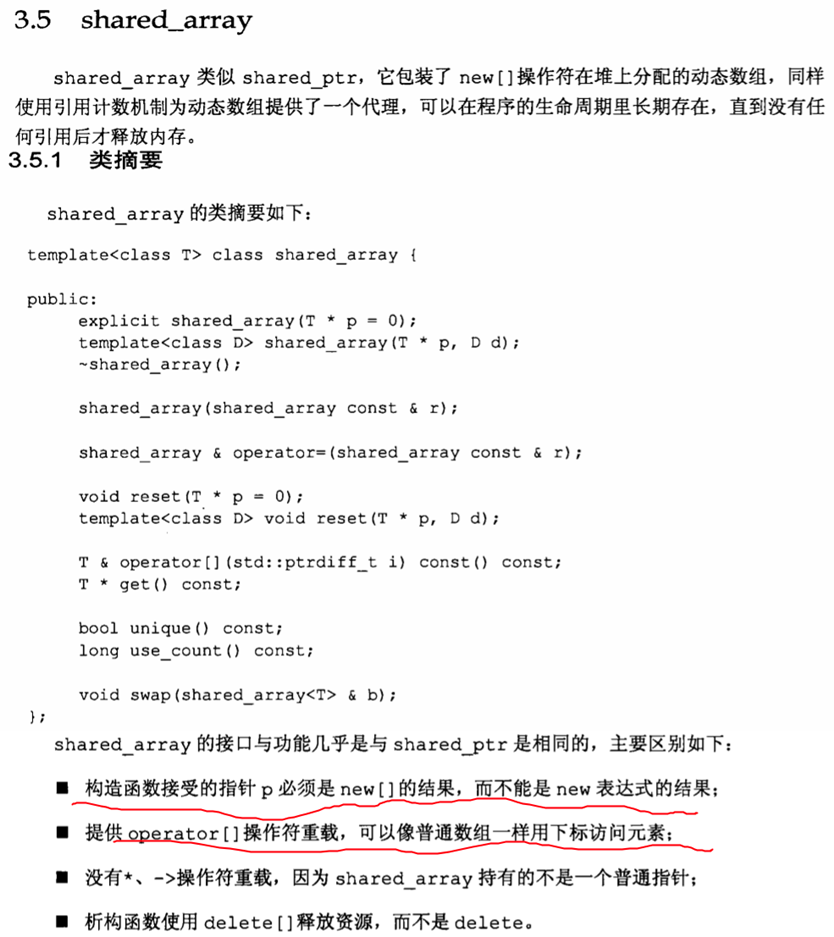
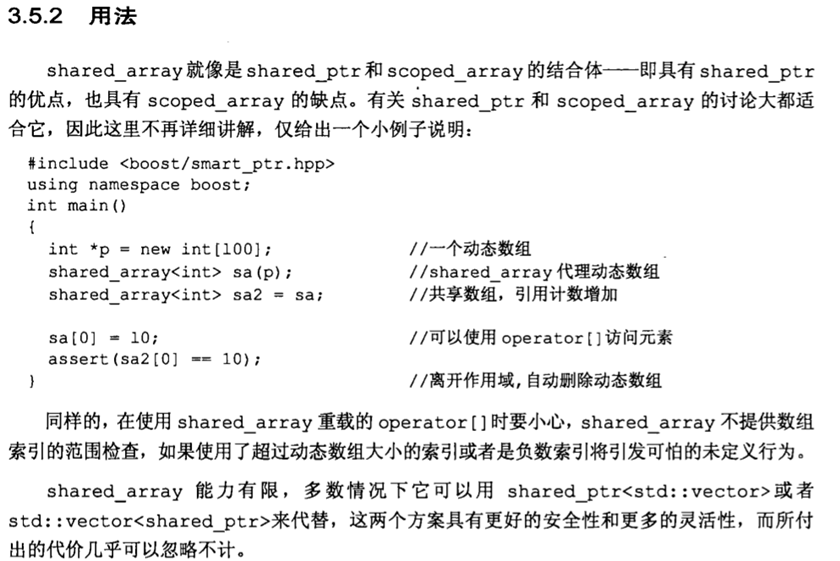
测试代码:
 View Code
View Code
#include <iostream>
#include <boost/smart_ptr.hpp>
using namespace std;
using namespace boost;
int main(){
int *p=new int[100];
shared_array<int> sa(p);
shared_array<int> sa2=sa;
sa[0]=10;
cout<<sa2[0]<<endl;
}
#include <boost/smart_ptr.hpp>
using namespace std;
using namespace boost;
int main(){
int *p=new int[100];
shared_array<int> sa(p);
shared_array<int> sa2=sa;
sa[0]=10;
cout<<sa2[0]<<endl;
}
7. weak_ptr
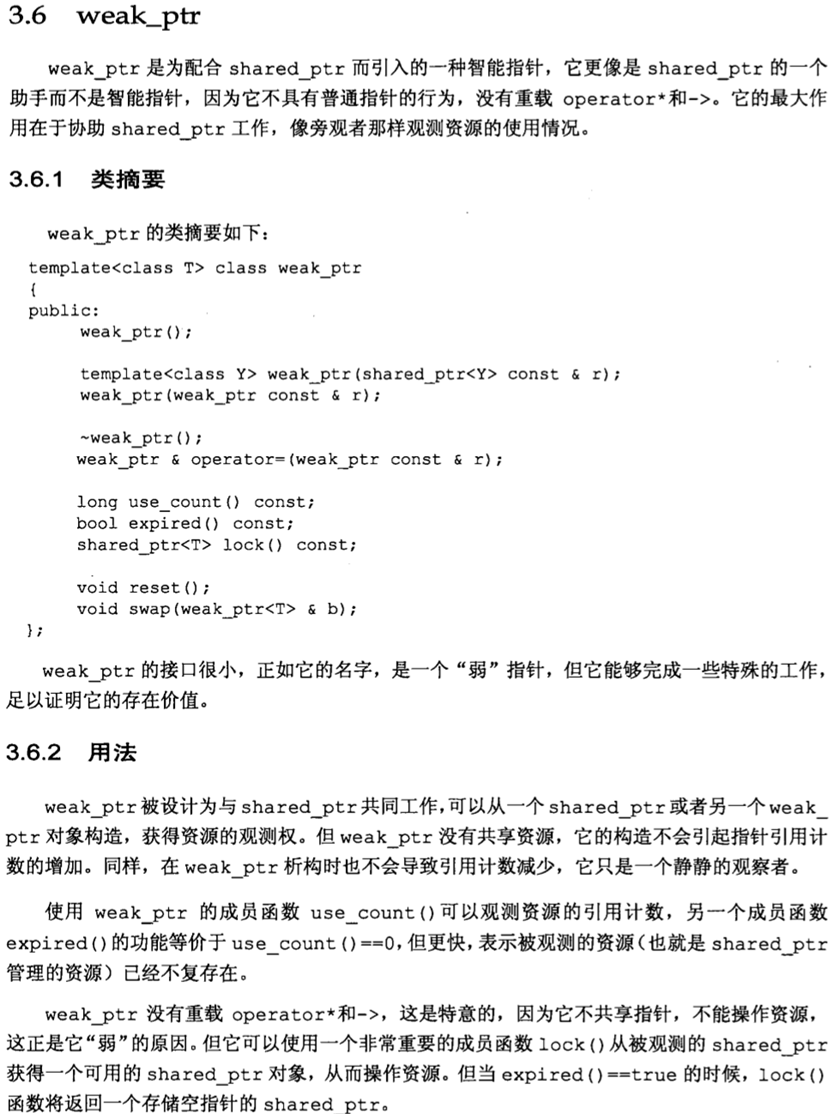
测试代码:
 View Code
View Code
#include <iostream>
#include <boost/smart_ptr.hpp>
using namespace std;
using namespace boost;
int main(){
shared_ptr<int> sp(new int(10));
cout<<sp.use_count()<<endl;
weak_ptr<int> wp(sp);
cout<<wp.use_count()<<endl;
if(!wp.expired()){
shared_ptr<int> sp2=wp.lock();
*sp2=100;
cout<<wp.use_count()<<endl;
}
cout<<wp.use_count()<<endl;
sp.reset();
cout<<wp.expired()<<endl;
cout<<wp.lock()<<endl;
}
#include <boost/smart_ptr.hpp>
using namespace std;
using namespace boost;
int main(){
shared_ptr<int> sp(new int(10));
cout<<sp.use_count()<<endl;
weak_ptr<int> wp(sp);
cout<<wp.use_count()<<endl;
if(!wp.expired()){
shared_ptr<int> sp2=wp.lock();
*sp2=100;
cout<<wp.use_count()<<endl;
}
cout<<wp.use_count()<<endl;
sp.reset();
cout<<wp.expired()<<endl;
cout<<wp.lock()<<endl;
}
8. intrusive_ptr
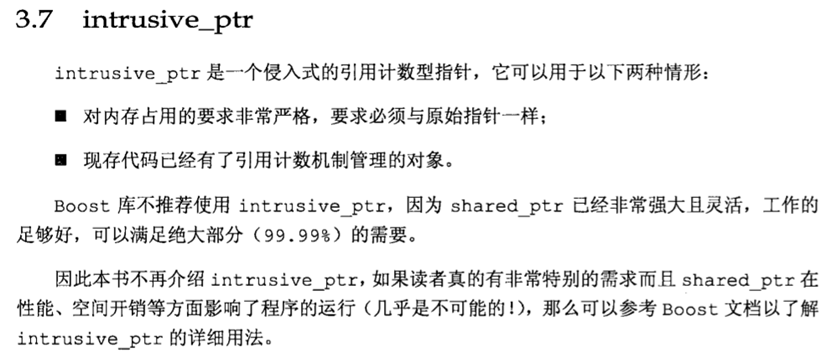
9. pool库,最简单的pool


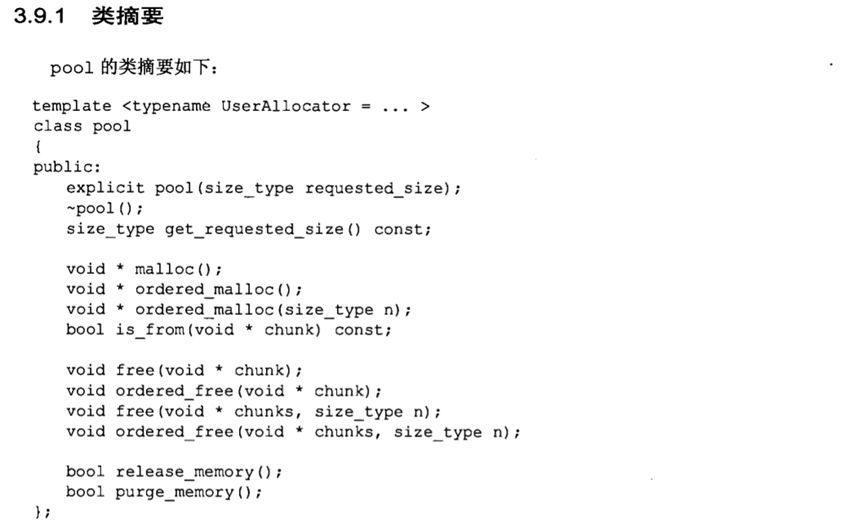
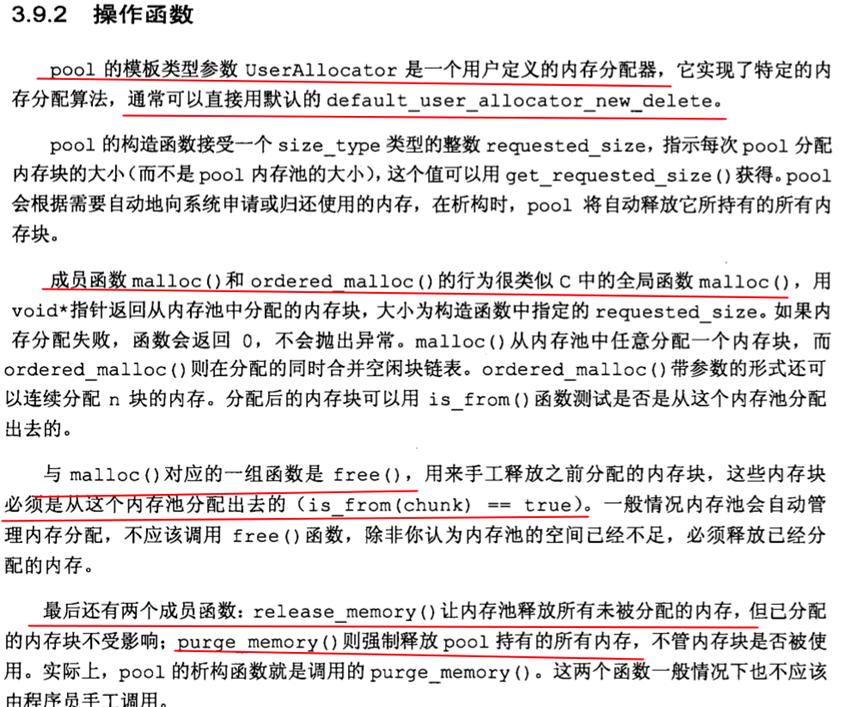
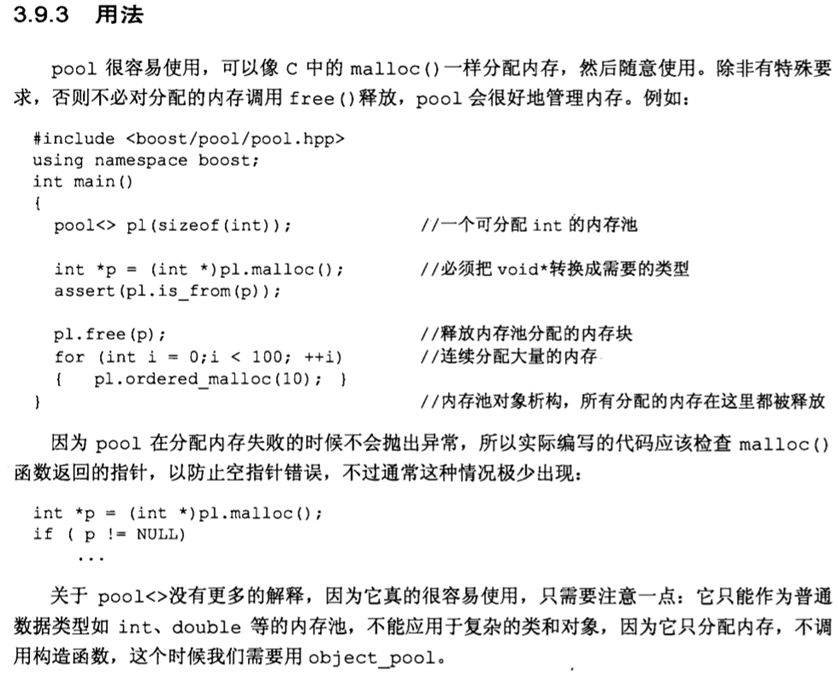
测试代码:
 View Code
View Code
#include <iostream>
#include <boost/pool/pool.hpp>
using namespace std;
using namespace boost;
int main(){
pool<> pl(sizeof(int));
int *p=(int*)pl.malloc();
cout<<pl.is_from(p)<<endl;
pl.free(p);
for(int i=0;i<100;i++){
pl.ordered_malloc(10);
}
}
#include <boost/pool/pool.hpp>
using namespace std;
using namespace boost;
int main(){
pool<> pl(sizeof(int));
int *p=(int*)pl.malloc();
cout<<pl.is_from(p)<<endl;
pl.free(p);
for(int i=0;i<100;i++){
pl.ordered_malloc(10);
}
}
10. object_pool
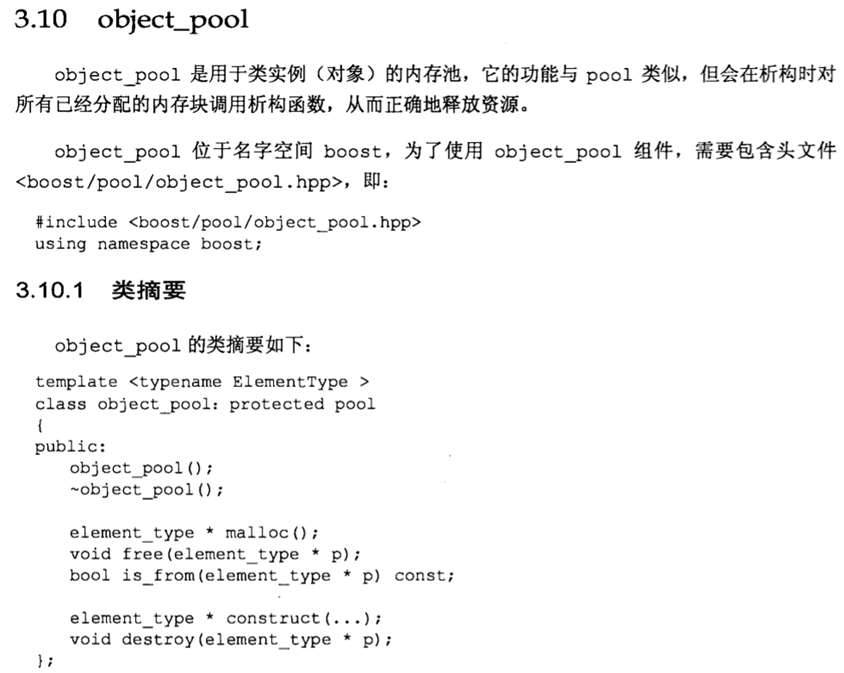
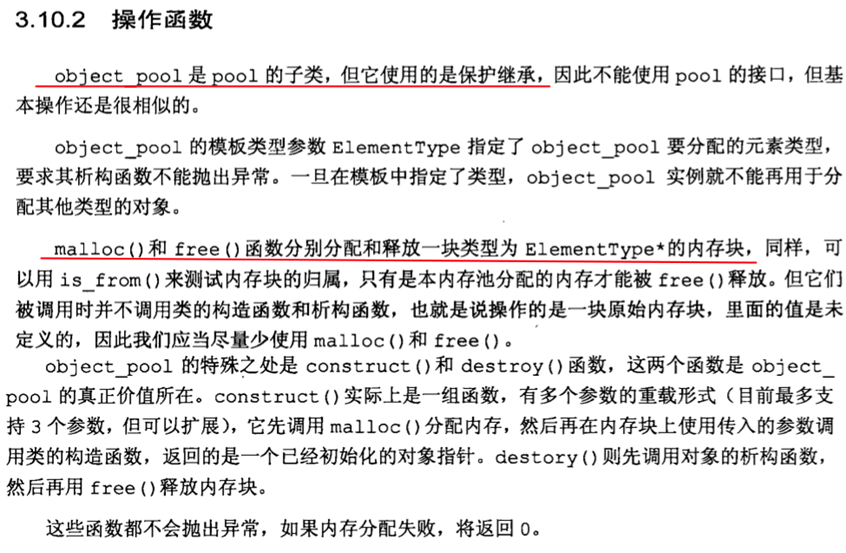
测试代码:
 View Code
View Code
#include <iostream>
#include <boost/pool/object_pool.hpp>
using namespace std;
using namespace boost;
struct demo_class{
public:
int a,b,c;
demo_class(int x=1,int y=2,int z=3):a(x),b(y),c(z){}
};
int main(){
object_pool<demo_class>pl;
demo_class *p=pl.malloc();
cout<<pl.is_from(p)<<endl;
cout<<p->a<<" "<<p->b<<" "<<p->c<<" "<<endl;
p=pl.construct(7,8,9);
cout<<p->a<<" "<<p->b<<" "<<p->c<<" "<<endl;
object_pool<string> pls;
for(int i=0;i<10;i++){
string *ps=pls.construct("hello object_pool",i);
cout<<*ps<<endl;
}
}
#include <boost/pool/object_pool.hpp>
using namespace std;
using namespace boost;
struct demo_class{
public:
int a,b,c;
demo_class(int x=1,int y=2,int z=3):a(x),b(y),c(z){}
};
int main(){
object_pool<demo_class>pl;
demo_class *p=pl.malloc();
cout<<pl.is_from(p)<<endl;
cout<<p->a<<" "<<p->b<<" "<<p->c<<" "<<endl;
p=pl.construct(7,8,9);
cout<<p->a<<" "<<p->b<<" "<<p->c<<" "<<endl;
object_pool<string> pls;
for(int i=0;i<10;i++){
string *ps=pls.construct("hello object_pool",i);
cout<<*ps<<endl;
}
}
11. singleton_pool
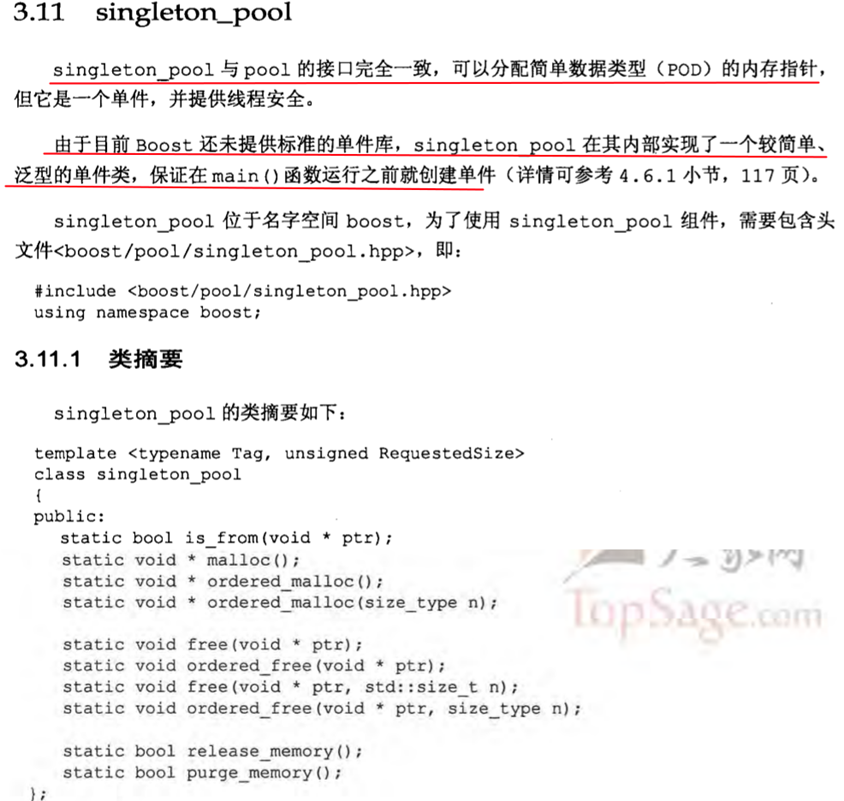
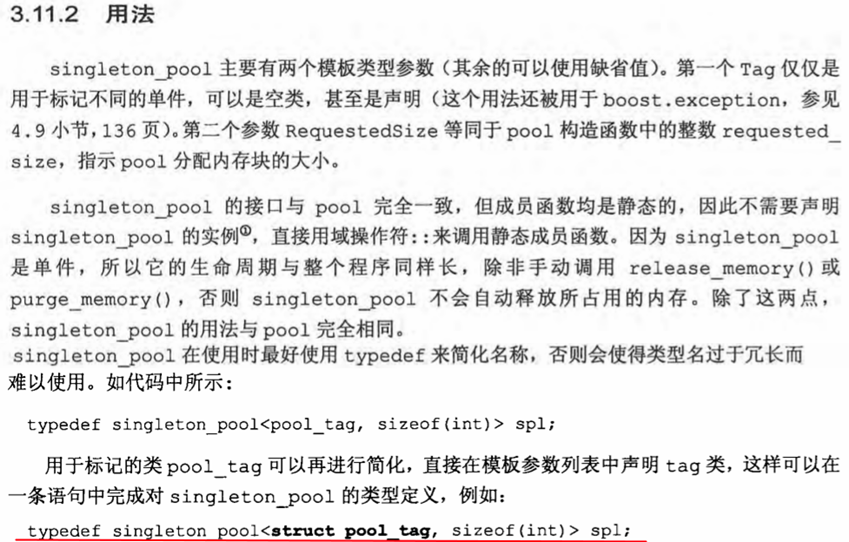
测试代码:
 View Code
View Code
#include <iostream>
#include <boost/pool/singleton_pool.hpp>
using namespace std;
using namespace boost;
struct pool_tag{};
typedef singleton_pool<pool_tag,sizeof(int)> spl;
int main(){
int *p=(int*)spl::malloc();
cout<<spl::is_from(p)<<endl;
spl::release_memory();
}
#include <boost/pool/singleton_pool.hpp>
using namespace std;
using namespace boost;
struct pool_tag{};
typedef singleton_pool<pool_tag,sizeof(int)> spl;
int main(){
int *p=(int*)spl::malloc();
cout<<spl::is_from(p)<<endl;
spl::release_memory();
}
12.总结
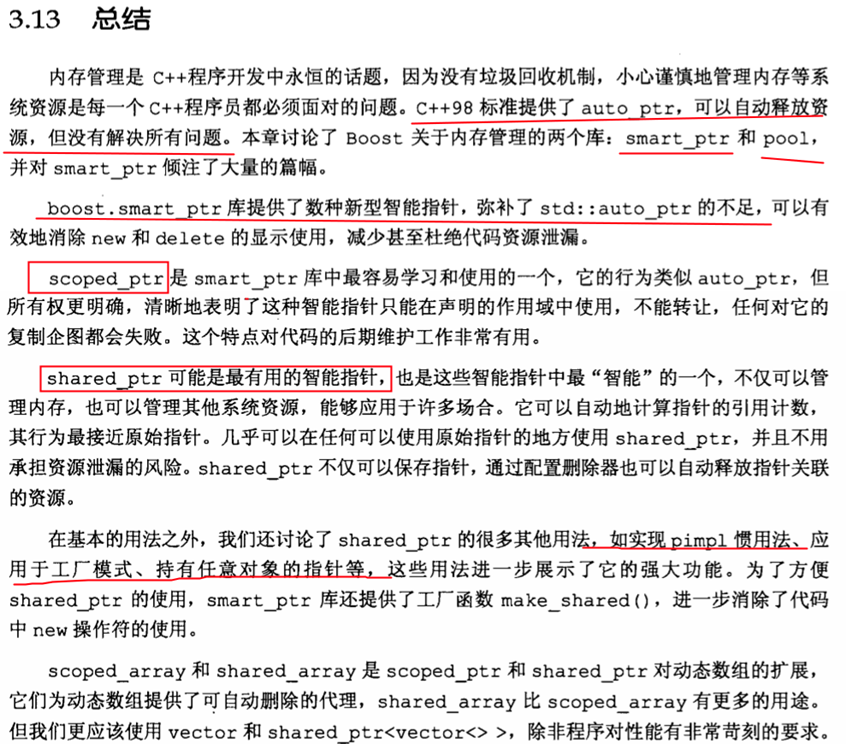

第4章 实用工具
UUID通用唯一标识码
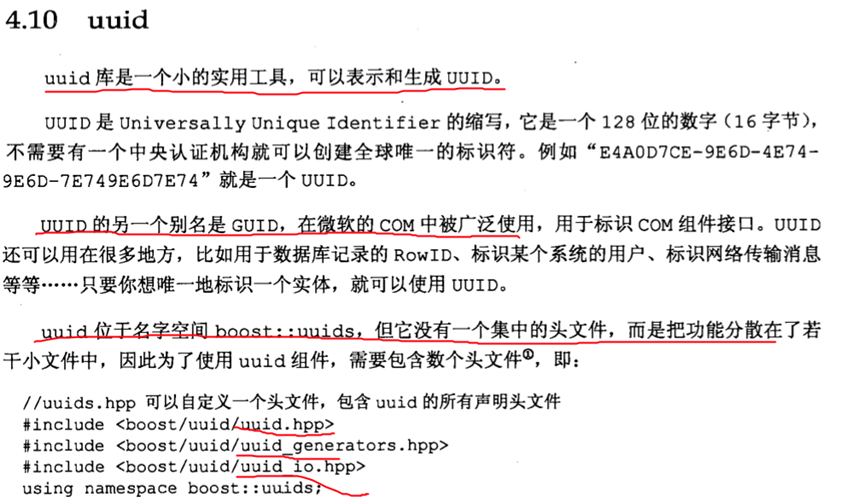
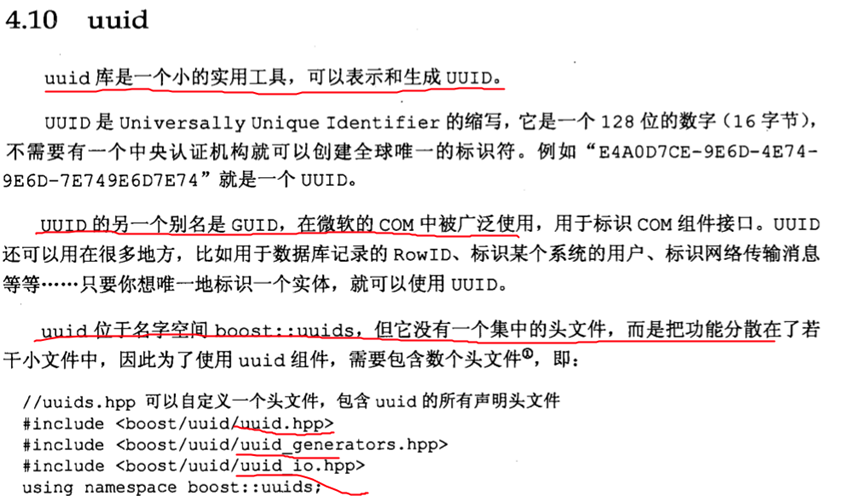

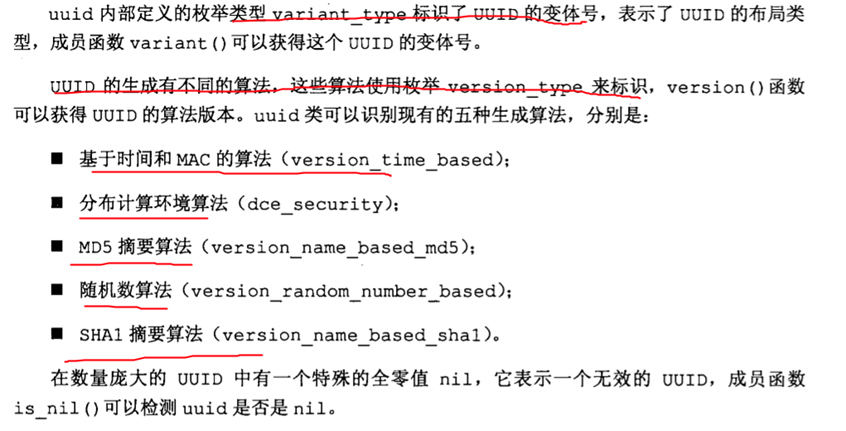
UUID中常用生成器
NIL生成器
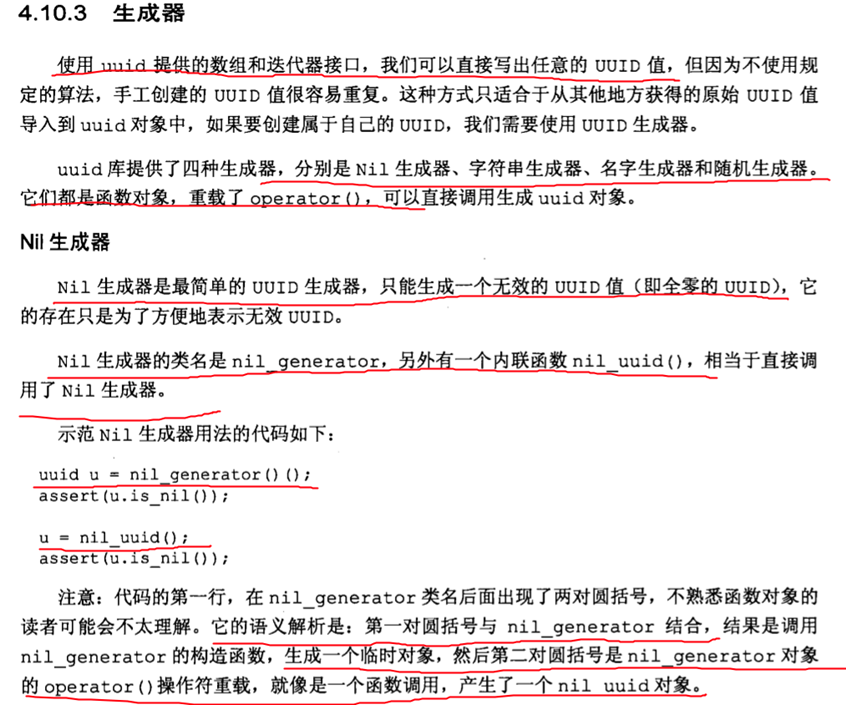
字符串生成器
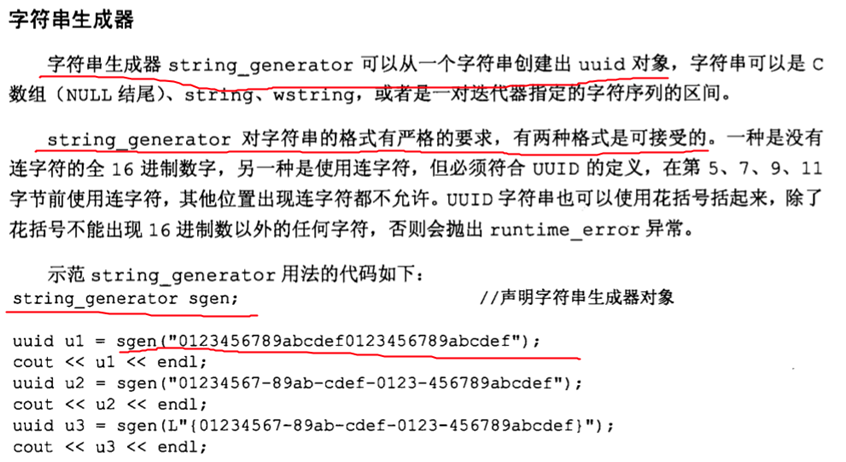
名字生成器
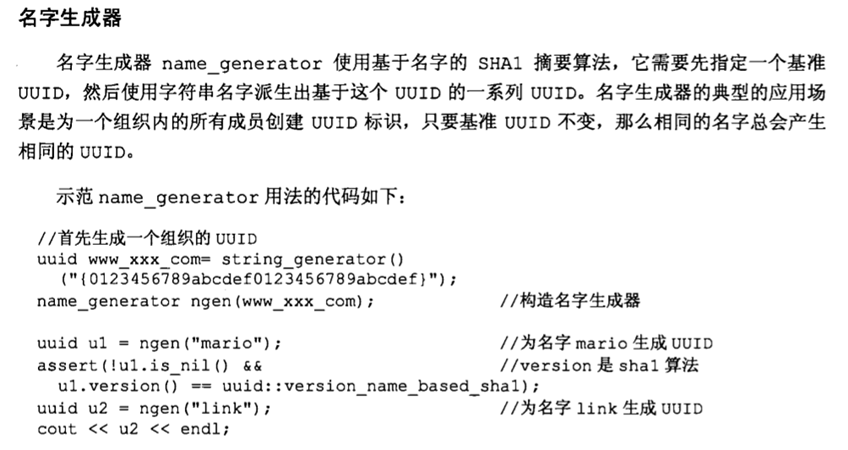
随机数生成器
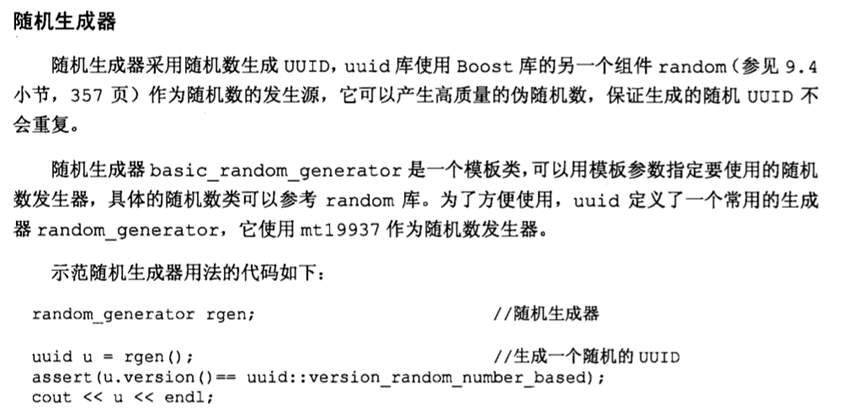
一个增强的UUID类
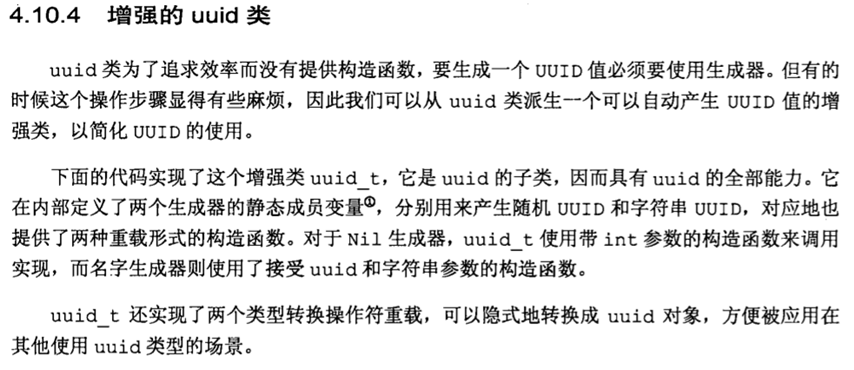
UUID与字符串之间的转换
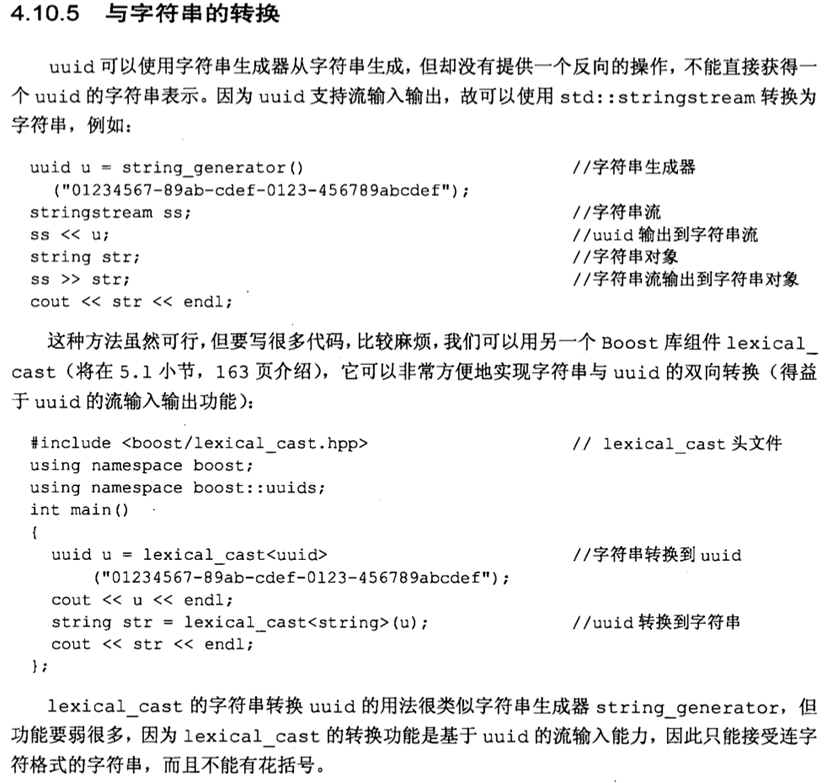
SHA1算法简介
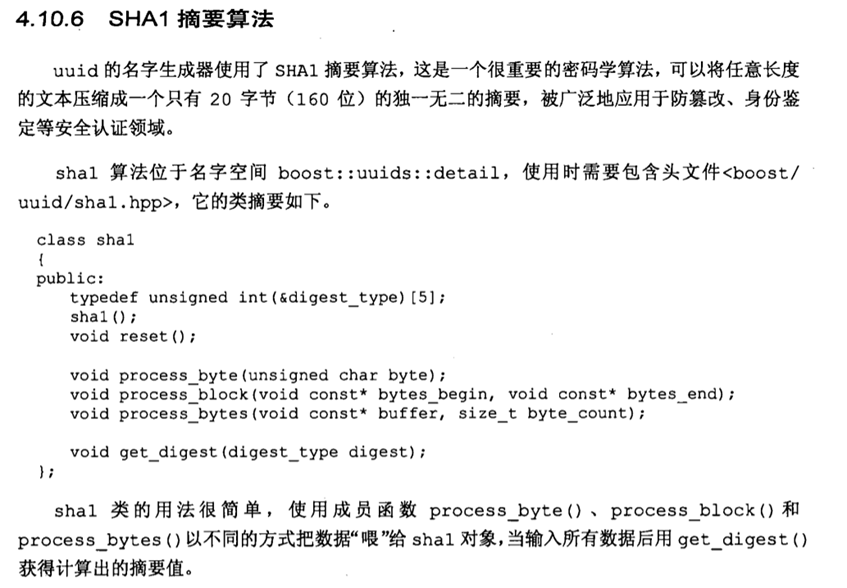
测试代码:
 View Code
View Code
#include <iostream>
#include <vector>
#include <iterator>
#include <algorithm>
#include <cstdlib>
#include <boost/uuid/uuid.hpp>
#include <boost/uuid/uuid_generators.hpp>
#include <boost/uuid/uuid_io.hpp>
#include <boost/lexical_cast.hpp>
#include <boost/uuid/sha1.hpp>
using namespace std;
using namespace boost;
using namespace boost::uuids;
using namespace boost::uuids::detail;
void test1(){
uuid u;
cout<<uuid::static_size()<<endl;
cout<<u.size()<<endl;
vector<unsigned char> v(16,'A');
copy(v.begin(),v.end(),u.begin());
cout<<"v=";
copy(v.begin(),v.end(),ostream_iterator<unsigned char>(cout," "));
cout<<endl;
cout<<"u="<<u<<endl;
fill_n(u.data+10,6,8);
cout<<u<<endl;
}
void nil_test(){
uuid u=nil_generator()();
cout<<u<<endl;
u=nil_uuid();
cout<<u<<endl;
}
void string_test(){
string_generator sgen;
uuid u1=sgen("0123456789abcdef0123456789abcdef");
cout<<u1<<endl;
uuid u2=sgen("01234567-89ab-cdef-0123-456789abcdef");
cout<<u2<<endl;
uuid u3=sgen(L"{01234567-89ab-cdef-0123-456789abcdef}");
cout<<u3<<endl;
}
void name_test(){
uuid www_xxx_com=string_generator()("{0123456789abcdef0123456789abcdef}");
name_generator ngen(www_xxx_com);
uuid u1=ngen("mario");
cout<<u1.version()<<endl;
cout<<u1<<endl;
uuid u2=ngen("link");
cout<<u2<<endl;
}
void random_test(){
random_generator rgen;
uuid u=rgen();
cout<<u.version()<<endl;
cout<<u<<endl;
}
class uuid_t:public uuid{
private:
static random_generator rgen;
static string_generator sgen;
public:
uuid_t():uuid(rgen()){}
uuid_t(int):uuid(nil_uuid()){}
uuid_t(const char* str):uuid(sgen(str)){}
uuid_t(const uuid& u,const char *str):
uuid(name_generator(u)(str)){}
explicit uuid_t(const uuid& u):uuid(u){}
operator uuid(){
return static_cast<uuid&>(*this);
}
operator uuid()const{
return static_cast<const uuid&>(*this);
}
};
random_generator uuid_t::rgen;
string_generator uuid_t::sgen;
void uuid_t_test(){
uuid_t u0=0;
cout<<u0<<endl;
uuid_t u1,u2;
cout<<u1<<endl;
cout<<u2<<endl;
uuid_t u3("0123456789abcdef0123456789abcdef");
cout<<u3<<endl;
cout<<uuid_t(u3,"test name gen")<<endl;
}
void lexical_test(){
uuid u=lexical_cast<uuid>("01234567-89ab-cdef-0123-456789abcdef");
cout<<u<<endl;
string str=lexical_cast<string>(u);
cout<<str<<endl;
}
void sha1_test(){
sha1 sha;
char *szMsg="a short message";
sha.process_byte(0x10);
sha.process_bytes(szMsg,strlen(szMsg));
sha.process_block(szMsg,szMsg+strlen(szMsg));
unsigned int digest[5];
sha.get_digest(digest);
for(int i=0;i<5;i++)
cout<<hex<<digest[i]<<' ';
cout<<endl;
}
int main(){
sha1_test();
}
#include <vector>
#include <iterator>
#include <algorithm>
#include <cstdlib>
#include <boost/uuid/uuid.hpp>
#include <boost/uuid/uuid_generators.hpp>
#include <boost/uuid/uuid_io.hpp>
#include <boost/lexical_cast.hpp>
#include <boost/uuid/sha1.hpp>
using namespace std;
using namespace boost;
using namespace boost::uuids;
using namespace boost::uuids::detail;
void test1(){
uuid u;
cout<<uuid::static_size()<<endl;
cout<<u.size()<<endl;
vector<unsigned char> v(16,'A');
copy(v.begin(),v.end(),u.begin());
cout<<"v=";
copy(v.begin(),v.end(),ostream_iterator<unsigned char>(cout," "));
cout<<endl;
cout<<"u="<<u<<endl;
fill_n(u.data+10,6,8);
cout<<u<<endl;
}
void nil_test(){
uuid u=nil_generator()();
cout<<u<<endl;
u=nil_uuid();
cout<<u<<endl;
}
void string_test(){
string_generator sgen;
uuid u1=sgen("0123456789abcdef0123456789abcdef");
cout<<u1<<endl;
uuid u2=sgen("01234567-89ab-cdef-0123-456789abcdef");
cout<<u2<<endl;
uuid u3=sgen(L"{01234567-89ab-cdef-0123-456789abcdef}");
cout<<u3<<endl;
}
void name_test(){
uuid www_xxx_com=string_generator()("{0123456789abcdef0123456789abcdef}");
name_generator ngen(www_xxx_com);
uuid u1=ngen("mario");
cout<<u1.version()<<endl;
cout<<u1<<endl;
uuid u2=ngen("link");
cout<<u2<<endl;
}
void random_test(){
random_generator rgen;
uuid u=rgen();
cout<<u.version()<<endl;
cout<<u<<endl;
}
class uuid_t:public uuid{
private:
static random_generator rgen;
static string_generator sgen;
public:
uuid_t():uuid(rgen()){}
uuid_t(int):uuid(nil_uuid()){}
uuid_t(const char* str):uuid(sgen(str)){}
uuid_t(const uuid& u,const char *str):
uuid(name_generator(u)(str)){}
explicit uuid_t(const uuid& u):uuid(u){}
operator uuid(){
return static_cast<uuid&>(*this);
}
operator uuid()const{
return static_cast<const uuid&>(*this);
}
};
random_generator uuid_t::rgen;
string_generator uuid_t::sgen;
void uuid_t_test(){
uuid_t u0=0;
cout<<u0<<endl;
uuid_t u1,u2;
cout<<u1<<endl;
cout<<u2<<endl;
uuid_t u3("0123456789abcdef0123456789abcdef");
cout<<u3<<endl;
cout<<uuid_t(u3,"test name gen")<<endl;
}
void lexical_test(){
uuid u=lexical_cast<uuid>("01234567-89ab-cdef-0123-456789abcdef");
cout<<u<<endl;
string str=lexical_cast<string>(u);
cout<<str<<endl;
}
void sha1_test(){
sha1 sha;
char *szMsg="a short message";
sha.process_byte(0x10);
sha.process_bytes(szMsg,strlen(szMsg));
sha.process_block(szMsg,szMsg+strlen(szMsg));
unsigned int digest[5];
sha.get_digest(digest);
for(int i=0;i<5;i++)
cout<<hex<<digest[i]<<' ';
cout<<endl;
}
int main(){
sha1_test();
}
总结:
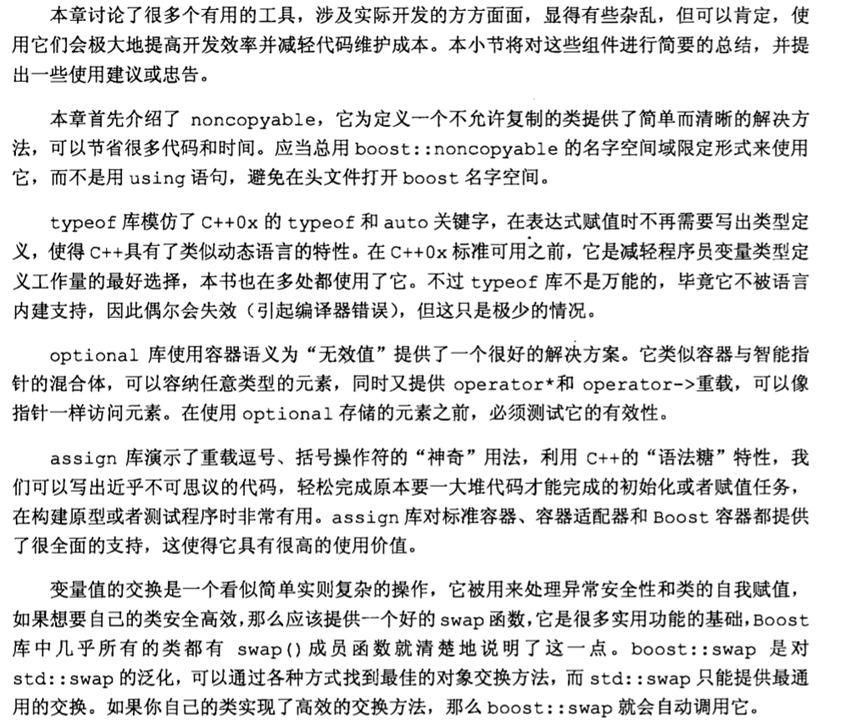

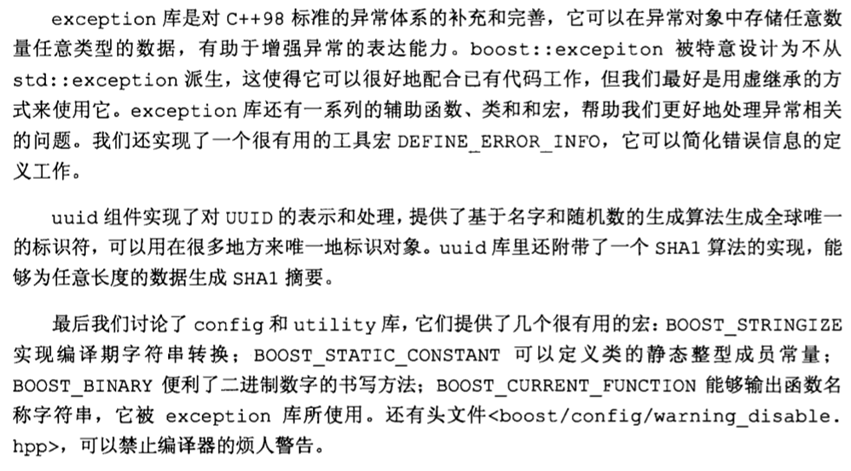




 浙公网安备 33010602011771号
浙公网安备 33010602011771号